#which this poll will shortly demonstrate
Explore tagged Tumblr posts
Text
HANAU, Germany—On a fall day in 2022, Serpil Temiz Unvar was sitting in her kitchen when, through the window, she saw an older man and a German shepherd standing outside. Assuming the man was a neighbor, Unvar opened her window to greet him. She was bewildered when he began asking her increasingly strange and aggressive questions: Are you Kurdish? Why did you leave your homeland? How do you have enough money to live here and to go on so many vacations back in Turkey?
The experience left Unvar, 51, deeply unsettled. After the man left, she called several friends who confirmed what she already suspected: The man with the German shepherd wasn’t just a neighbor. He was also the father of her son’s killer.
Unvar’s son Ferhat, then 23, was one of nine people shot and killed in a violent rampage targeting immigrants on Feb. 19, 2020. The shooter, Tobias R., opened fire at a bar in Hanau’s center before driving across town, where he shot a man who had followed him from the first bar by car. Then, Tobias R.—identified by his first name and last initial in keeping with German privacy laws—walked into the Arena Bar & Cafe, showering patrons in a spray of bullets, Ferhat among them. The shooter then drove to his mother’s house, killed her, and turned the gun on himself.
The shootings shook Hanau, a city of just over 100,000 people 15 miles east of Frankfurt. The city is among Germany’s most diverse: Nearly 30 percent of Hanau’s population does not hold a German passport, according to recent city statistics, around twice the national average. German media reported that Tobias R. had posted a manifesto on his website shortly before the attack, which authorities described as demonstrating a “deeply racist attitude.”
The Hanau attack became a symbol of Germany’s struggle to extinguish far-right violence and anti-immigrant ideology. Then-Chancellor Angela Merkel condemned the attack, warning, “Racism is a poison. Hate is a poison.” But soon, news crews departed. Politicians who had offered solemn condolences moved on to other matters, and the country went into lockdown as the COVID-19 pandemic took hold.
Unvar felt a growing sense of rage at the government’s lack of response to the Hanau attack, she told me when I sat down with her in March. Later that year, she became an activist: She founded an educational initiative aimed at fighting racism in schools; testified on the Hanau killings in the state parliament of Hesse, where Hanau is located; and worked with the family members of other victims to pressure the government to take action to prevent future racist attacks.
But honoring Ferhat’s memory has made Unvar a target herself. The man’s 2022 visit to her home wasn’t an isolated event; Hans-Gerd R. came back that night and the next day. After Unvar filed a restraining order against him, he started sending her letters. “If you as a migrant hate the land of the German people, then please leave it, and quickly, and please go back to where you came from,” he wrote in one missive. The harassment and stalking are still going on, she told me.
Unvar’s fight against racist ideas about who belongs in Germany has laid bare how deeply ingrained this ideology remains in parts of the country—particularly as the far-right Alternative for Germany (AfD) party continues to creep up in the polls. “We want to trust this country, but this country also needs to protect us,” she said. “But how? I don’t know.”
The Hanau murders came on the heels of a string of other deadly racist attacks in Germany. Less than six months earlier, in October 2019, another right-wing extremist showed up at a synagogue in the eastern city of Halle on Yom Kippur intent on murdering Jewish worshippers; he ultimately killed two people outside the synagogue. Earlier that year, a local politician in the Hessian town of Kassel, Walter Lübcke, was shot and killed by a right-wing extremist who was unhappy over the politician’s welcoming policy toward refugees.
Hanau commanded particular attention because it was a targeted assault on people with “immigration backgrounds,” the official term Germany’s Federal Statistical Office uses to describe those who were born to at least one parent who was not a German citizen. German authorities also faced intense scrutiny for their handling of the incident.
The killer had been allowed to purchase a gun despite past indications that he had a mental illness, which authorities did not adequately investigate before issuing him a weapons permit. The Hanau police were slow to respond to emergency calls about the shootings because they were chronically understaffed. An investigation by regional authorities also revealed that 13 of the officers who responded to the attack were part of a police unit that was later disbanded due to a scandal over membership in right-wing chat groups.
In the Arena Bar, where Ferhat was killed, an emergency door had been locked to keep patrons from fleeing during regular police raids on the venue to look for illegal drugs. A damning investigation by the U.K.-based group Forensic Architecture featured in an exhibition in Frankfurt two years ago found that all five of those killed in the bar could have survived had the door been unlocked.
Late last year, after years of testimony and hearings, a Hessian parliamentary committee investigating the authorities’ response to the attack issued its final report. In 642 pages, it details the various security failures that contributed to the loss of life that day. But without concrete consequences for those responsible for the security failures in Hanau, victims’ family members say it’s hard to believe anything will meaningfully change in how Germany handles right-wing and racist terrorism.
None of the officers or authorities involved in Hanau’s security failures were disciplined or removed from their posts explicitly due to their handling of the situation. Although the Hessian parliamentary committee’s report outlined areas where German law enforcement had fallen short, those who lost family members that day felt its recommendations—for more stringent checks before issuing weapons permits, to develop anti-racism programs in schools, and to better communicate with families of victims—offered little more than lip service.
Armin Kurtovic, whose son Hamza was killed in the attacks, described the report as a “slap in the face” to the victims’ families. “I was convinced something like this wasn’t possible in this country,” he told German broadcaster Hessenschau late last year. “But the more I get involved and the more I read, the more I see: This is continuity.”
Police officers’ handling of the investigation was infuriating to Serpil Temiz Unvar, but it was hardly surprising to her and others who have tracked the history of far-right attacks in Germany. The authorities’ seeming blind spot for this kind of violence—and a lack of concrete action to prevent it—extends back far beyond Hanau.
The most famous case of recent far-right violence in Germany was that of the National Socialist Underground (NSU), a neo-Nazi terrorist cell that killed 10 people, mostly immigrants, across Germany over the course of 13 years, evading police notice. In their investigations of each murder, the police fell back on racist stereotypes of immigrants, assuming that those slain had been involved in the drug trade or victims of immigrant-on-immigrant crime; the German media dubbed them “kebab murders.”
“A nation that liked to think it had atoned for its racist past [was] forced to admit that violent prejudice was a thing of the present,” American journalist Jacob Kushner wrote in his recently published book on the NSU murders, Look Away, adding that “in an age of unparalleled mass migration, the targets of white terrorism are increasingly immigrants.”
When I arrived at the offices of Unvar’s organization, the Ferhat Unvar Educational Initiative, in March, the first thing I saw was a black-and-white mural of Ferhat. Wearing a cap and looking forward, his face appears next to the words “We are only dead when we are forgotten.” Ferhat had posted the phrase on social media before his death. It has now become his mother’s guiding principle as she builds an organization to honor his memory.
Unvar grew up in a Kurdish city in southern Turkey, near the border with Syria. Her father moved to Paris, and she eventually joined him. She moved to Hanau when she married a Kurdish man there, with whom she had four children, including Ferhat, before later separating.
In the months after her son’s killing, Unvar said she agonized over what she could have done to make his life better while he was still alive. She thought about the discrimination he faced in school as a student with an immigration background and found herself wracked with guilt that she hadn’t fought harder for him: pushing school officials harder to allow him on a more ambitious track of study, for example, or urging them to stop the discrimination he faced from teachers and other students.
Ferhat was gone, but many other children with similar backgrounds faced those same tough odds at school—and there was still a way to help them, Unvar remembered thinking. Nearly nine months after the attack, on Ferhat’s birthday in November 2020, Unvar officially founded her organization, which seeks to combat racism and discrimination in the German education system, giving talks and holding trainings and workshops to empower young people struggling against systemic racism and to educate teachers about the challenges that students from immigrant communities face.
Her first donation was from a group of Ferhat’s friends, who handed her an envelope with 125 euros they had raised together. She was touched and buoyed by the gesture. “I said, OK, I couldn’t help Ferhat, but I can help them through Ferhat,” she said.
The organization has since scaled up significantly. Donations and grants helped Unvar hire staff and spread the word about their anti-discrimination workshops. Some are for school-age children and youth, giving them a safe space to talk about their experiences of discrimination or racism; others are for teachers and educators, training them to root out racism in their classrooms; yet more are for adults in other professions, including airport staff at Frankfurt Airport. Along with Initiative 19 February Hanau, an organization run by the family members of several of the Hanau victims, Unvar’s initiative won the Aachen Peace Prize in 2021.
“I never had it in my head to do something like this,” said Unvar, reflecting on how her life changed after the attack. Sitting on a black couch in one corner of the organization’s big event space, with posters depicting the organization’s logo and events on the walls and brochures for her training programs on tables across the room, Unvar was animated as she described how she and others have built the initiative into what it is today. At the same time, she said, so “many people instrumentalize [the attack], not just politicians but also others. That hurt me deeply.”
Unvar told me that she hopes to create a cross-border support network for families of victims of terrorism. In Greece, she met Magda Fyssa, the mother of Pavlos Fyssas, a young anti-fascist musician murdered by members of the neo-Nazi organization Golden Dawn. She has also traveled to Norway, Spain, and France to meet with other families of terrorist victims and with organizations that combat terrorism. Unvar spoke with local activists and experts about ways to collaborate in their fight against violent extremism and learn from one another’s experiences.
“Regardless of which country I was in, I never felt alone,” she said. “I saw how many other people are also fighting in this direction against terror, for humanity, for human rights—that gave me strength.”
But Unvar admitted that it can be difficult to press forward with her activism while feeling that no matter how hard she works, or how hard others work, her efforts are unlikely to change a country unwilling to address its shortcomings when it comes to welcoming and safeguarding immigrant communities.
In January, the German investigative news outfit Correctiv released a report about a secret meeting between right-wing extremist leaders near Berlin, including members of the far-right AfD. Those present discussed a “remigration” plan to deport millions of people with immigrant backgrounds, including those with German passports.
Unvar said the national outrage over the Correctiv report—and the millions of people who turned out to protest across the country in the weeks that followed—gave her hope that the German population at large finally understood the scale of its problem with right-wing extremism. “It’s good that [the story] came out because then people like us can see how big and important a problem it is,” she said. “The racists—they’re not letting up. We’ve seen the danger is there. … We need to really hold together against the right wing and against terror.”
Still, the AfD continues to gain ground. Riding a wave of support for far-right parties across Europe, the party gained 5 percentage points in June’s European Parliament elections, coming in second—ahead of all three of Germany’s governing parties—with 16 percent of the vote. The AfD then won its first state-level victory in the eastern German state of Thuringia on Sept. 1, taking 32.8 percent of the vote; in neighboring Saxony, it came in a close second to the center-right Christian Democrats, with 30.6 percent of the vote. A third eastern state, Brandenburg, votes on Sept. 22; the AfD is leading the polls there.
The far-right party is also a growing threat in Unvar’s home state: In the years since the attack, Hesse’s political landscape has shifted to the right. The AfD won 18.4 percent to become the second-largest party in last fall’s state elections, an increase of 5.3 percentage points from the previous election in 2018.
In February, around the anniversary of the Hanau attack, Hans-Gerd R. sent Unvar another letter. Another one followed this spring.
Hans-Gerd R. has been cited dozens of times for harassing Unvar and other victims’ family members and for repeatedly violating a restraining order against Unvar. He was taken into custody when he defied the restraining order and showed up outside her house again in 2023. He was also briefly sent to jail that year for failing to pay his fines for the various citations he had received related to that harassment.
But despite the restraining order, the police told Unvar that they can’t do anything about the letters that keep arriving at her house: There are no laws in Germany against sending missives to someone via the postal system, regardless of the intolerance they contain.
Hanau Mayor Claus Kaminsky described Hans-Gerd. R’s harassment of Unvar and other victims’ family members as “subtle, almost diabolical” terrorism in a 2023 interview with the German broadcaster ARD, saying he wished the man would leave Hanau. But he reiterated that there is little the authorities can do beyond the penalties they have already put into place. “Of course, it would be best if the father left the city, if he changed his place of residence,” Kaminsky said. “That might even be better for him. But there is no legal way to force this.”
Toward the end of our time together, I asked Unvar whether she was afraid that Hans-Gerd R. would escalate from letters and leering outside her kitchen window to something worse. Unvar’s youngest son, Mirza, who is 11, had just come into the office and sat down next to her on the black leather sofa. She wrapped her arms around him as he looked up shyly.
“I’m not afraid, no. I really have zero fear—what should I be afraid of? What can happen? I’ve already lost my dearest son,” she said.
Ultimately, as she told me repeatedly throughout the course of our conversation, her fight isn’t about her. The educational initiative, the connections abroad, the advocacy, the long hours of volunteer work—it’s about children like Ferhat who struggle to get ahead in school because of the color of their skin; it’s about Mirza, sitting on the couch next to her, being able to grow up feeling safe.
“The killer’s father is still a danger to my family,” she said. “I don’t fear for myself, but I have children.”
53 notes
·
View notes
Text
Cyn Headcanons
Cyn won the poll I hosted! I also got WAY more notes than I expected so I am only during 30. Sorry, but its the only way to keep me from writing duplicates, low quality HCs, etc. Please like and reblog if you enjoy, as it lets me know I am writing content people enjoy, and it helps to spread my posts around! The more viewers, the more feedback I get, which is the most valuable resource to me.
So, without further ado,
30 Cyn Headcanons (Some serious, some silly)
Serious Headcanons 1. Prior to her disposal, Cyn worked as a toy assembler/demonstrator. This is why she would overexplain her actions, since toys can't exactly speak. This would later go on to influence the Solver's outlook on humanity and how it should be treated.
2. Cyn's cause of fatal error was not a workplace accident, but execution (murder) from a higher up at the company she was employed at. Reason? Up to you, whichever makes it most tragic :)
3. The Cyn we see in the show was only partially controlled by the Solver for some sections. When she was first brought home, barely noticeable influence, like 10% controlled. By the start of episode 5, about 70% of her was controlled by the Solver, but the excitement about Movie Night was genuine!
4. Solver-Cyn left Tessa for last on the night of the Gala Massacre. She had warned Tessa to not come, which shows that she didn't want to have to kill her.
5. While J was the first to fall under control of Cyn's Solver abilities, J was the last to be 'modified'.
6. While the Solver is fully in control of Cyn by the time the events of the show start playing out, Cyn is still within the consciousness of the bodies the Solver takes over. This includes being witness to Uzi's first transformation and Doll's mind.
7. Cyn was certainly younger than the other drones, and due to this she was never switched out of 'Parental Guidance Mode' that censors swearing (Like Uzi being unable to see Nori's crude writings). This is why Cyn couldn't fully swear when she lost grip of N's core.
8. The Cyn part of Solver has abandonment issues. This is why she was willing to clone the main cast of Disassembly Drones rather than see them as just tools. It is also why Cyn was willing to leave them alone if they obeyed her orders, despite her plan that consisted of consuming all matter possible. If she could keep them as friends, she would.
9. While still herself, Cyn had OCD and was very meticulous about her tasks. For the short time she was 'employed' at the Elliot Manor, she was particularly good at stacking and arranging of objects. Unfortunately, this would become arrangements of triangular hexagons and other mysterious symbols shortly before she was deemed too damaged to work.
10. Cyn did not create a solution for the Murder Drones to not burn in the sun because she sees it as a way to keep them restrained. The less time they can be out doing whatever they want, the less likely they are to figure out any sort of deception or way to usurp her.
11. If Cyn did not have to take a more direct approach for her plan to succeed by the end of Episode 7, she would have a fear of Sentinels while not in her 'blackhole' form after the events that transpired in Episode 6.
12. Cyn's 'birthday' was April 14th, 3052.
13. Cyn seems to have an infinite supply of bows. Nobody knows where she gets them from or how she keeps making them.
14. Post-Finale, Cyn would constantly be trying to hijack pieces of technology to gain more power. Fortunately, none of these attempts would get far due to Uzi's capable technological skills.
15. What would keep Cyn docile would be allowing her to hijack weak and limited pieces of technology, like an old game cartridge or a singular floppy disk. However, this ruins any sort of data stored on the item in question but would definitely create the closest example to those early 2000 creepypastas like 'Sonic.exe' and other 'my video game was hAuNtEd' types of scenarios.
Silly Headcanons
16. Cyn genuinely enjoys tea. Unfortunately, she does not know how to drink it properly.
17. If Cyn got an animal plushie of herself like Uzi, N, and V did, it would be an Octopus.
18. Cyn wasn't one to be impatient or throw temper tantrums like in Episode 5, that was all the Absolute Solver.
19. Cyn could have been knocked out for a few hours if you threw a big enough weighted blanket over her.
20. Cyn would host 'oil tasting parties' as a crude way of replicating the activities of her former owners.
21. Cyn's 'startup message' is not "Hello World." It is instead "Violence is the question and the answer is yes."
22. If you gagged Cyn's mouth in any way, she would use sign language to be able to communicate her actions in excessive detail, just like she does when she speaks. ("Light sip" or "Shuffle. Shuffle. Shuffle.")
23. If you gave Cyn a YouTube channel, she would market it like those "Spiderman Elsagate" videos completely unironically, but then have the content be very in-depth analyses of complex equations and theories.
24. Cyn does NOT know what sex is. She thinks humans reproduced by being delivered a child via Stork.
25. Cyn's knowledge of emojis (her last reaction in Episode 8) comes solely from what she could hijack from V's mind when she still had control, since V was texting Lizzy at some point in time.
26. Cyn sees William Afton as a role model.
27. Cyn's choice of play in GTA would be using mods to make everything fly around at high speeds and explode at random.
28. If you slapped Cyn across the face, her head would spin around on her neck until the momentum fully stopped.
29. Cyn is the kind of drone to taste-test a footprint and be able to know where somebody went.
30. A McDonald's sprite would be enough to kill Cyn.
#murder drones#murderdrones#murder drones cyn#murderdrones cyn#md cyn#md#murder drones headcanons#md headcanons#murderdrones headcanons
46 notes
·
View notes
Text
Why is Tyrian a better fighter than Neopolitan?
Ok, a week ago I did a poll for fun about who would win in a Vs between Tyrian and Neo, however the result left me a little perplexed. So to complement it, I would like to offer my own point of view and why I think Tyrian could beat Neo in a fight;
(Small Warning: English isn't my native language, so if there are any grammar errors I'm sorry and I would appreciate it if someone would tell me)
First of all, I won't allow myself to be corrupted by fanaticism, I know and emphasized that Neo is a skilled fighter and shouldn't be underestimated in the slightest. Outside of her amazing semblance, as revealed in the novel Roman Holiday, she briefly received training from a special assassin training program shortly before joining Roman and also receiving his tutelage. In addition to the fact that throughout the show, she demonstrated that she could stand up to characters like Yang or Cinder, who as we know shouldn't be taken as a joke either, and in recent volumes she also demonstrated that she has a certain manipulation skill, which combined with her semblance, makes her especially unpredictable against vulnerable opponents, as seen in his fight against Team JNOR and, above all, in Volume 9 with Ruby.
However, there is a crucial detail in his record that is the reason why I believe he wouldn't emerge victorious in a fight against Tyrian. Most of his combat exploits and victories were against fighters in training, also skilled but young after all. The closest thing he ever faced to an experienced fighter was Cinder; At the beginning of this fight, Neo was on par with Cinder mainly because she was taken by surprise, but as the fight progresses you can see how Cinder is progressively gaining ground, even when she is holding back since, in addition to having not interest in fighting her for being out of his priorities, in between he tried to talk to her before resorting to using weapons and his Maiden powers.
But when we get to the V8 E5 something quite unusual happens. In her brief fight against Maria Calavera, a veteran and widely experienced huntress, María proved to be able to overcome her without problem and was even able to mock Neo like she usually does with others, and everything seems to indicate that he could have won if it hadn't been for Cinder's distraction.
Now speaking of Tyrian, while we don't know how he acquired his abilities, it has been made very clear as the story progresses how formidable and lethal he is, both implicitly and directly: As revealed in V7, he was a criminal and serial killer who became recognized and feared outside his kingdom, to the point that it was necessary to carry out a joint operation between Atlas and Mystral to stop him. Until his transport was intercepted by Salem, who generally prefers others to do the legwork and has only been seen personally gone out to take over the Kingdom of Atlas once the scene was secured, to recruit him herself.

Already from volume 4 you can see his incredible skill. In episodes 6 and 7, we can see how he was able to track down Team RJNR in a matter of days and once he reached them he was able to subdue them without any problem, even being able to easily stop a hammer blow from Nora loaded with his semblance, which was previously able to knock out a entire team and was then able to send Hazel flying.
He practically would have won if it hadn't been for Qrow's intervention and when they get into a fight, Tyrian proves to be on par until the end with Qrow, sober and serious, a member of Ozpin's inner circle and who is considered one of the best, if not the best huntsman in Vale and even with the external intervention of Ruby, Ren and Nora. The only time where he seems to have the advantage is when Tyrian is distracted by Ruby's gunfire. To explain this moment, there is a theory that Tyrian, as he is a scorpion faunus, has poor eyesight or is directly blind, since in real life scorpions are myopic, especially in light, and therefore depends on his other senses as well as his ability to feel the pulsations of movement, which could actually explain his great reaction time and how he was able to stop Ruby's shots without even looking, among others. Although theories aside, despite this brief moment of disadvantage, Tyrian recovers the moment Qrow retrieves his weapon, even to the point of weakening his aura.
Then, in episode 11, when she suffers a mental breakdown and attacks an Ursa, we can see how Cinder's expression is one of absolute horror, which says a lot if we talk about Cinder precisely; megalomaniacal psychopath who doesn't tremble the time to kill and confront opponents like Raven (who had previously made Neo retreat), who has only been afraid of Salem and who later confirmed to us that she knows Tyrian's capabilities and therefore, it is not unreasonable to think that her reaction is It owes, in addition to the impact of the scene, to the extremes to which it knows it can go in its maximum madness.
In fact, later in V5 E11, she revealed that it was him and Hazel who killed all the huntsmen and huntresses at Haven Academy, something they could have done even without the information Leonardo gave them, which makes sense seeing how effective he is Tyrian as a tracker and hunter, to the point that Salem gave him the task of tracking down the Spring Maiden, who was missing, in addition to his feat in the previous volume, of course.
Go back in Volume 7, the CRWBY attempted to show more clearly how formidable he is by putting him in a fight against Qrow accompanied by Clover, an elite agent and Ironwood's right-hand man, and Robyn, leader of an operation. Although he ended up losing, it doesn't take away his impressive physical demonstration in terms of strength, speed and reaction, not to mention that this event would give rise to showing his tenacity now not only physically, but also psychologically during the confrontation between Clover and Qrow. Not only was he able to quickly take advantage of the conflict between the trio to crash the ship and then pretend to be unconscious so as not to be taken into account and thus finish freeing himself, but he was then able to identify the situation of his opponents, he perceived that Clover's priority was blindly Qrow on him so he quickly took advantage of their conflict, he managed to subtly manipulate both Huntsmen so that they only focused on each other until they forgot about him for a moment, taking advantage of it to kill 2 birds with one stone: kill Clover and he frames Qrow for it.
(I'll pause for a moment to say that I personally love this sequence. It clearly has its questionable decisions, but in addition to being wonderfully choreographed, it perfectly exemplifies Salem's main modus operandi: Divide and conquer)
In general, this isn't the only display of emotional intelligence on Tyrian's part, it could also previously be seen in his talk with Mercury and Emerald in Volume 6, being able to identify the true connotations behind Mercury's words and mocking his insecurities not recognize.
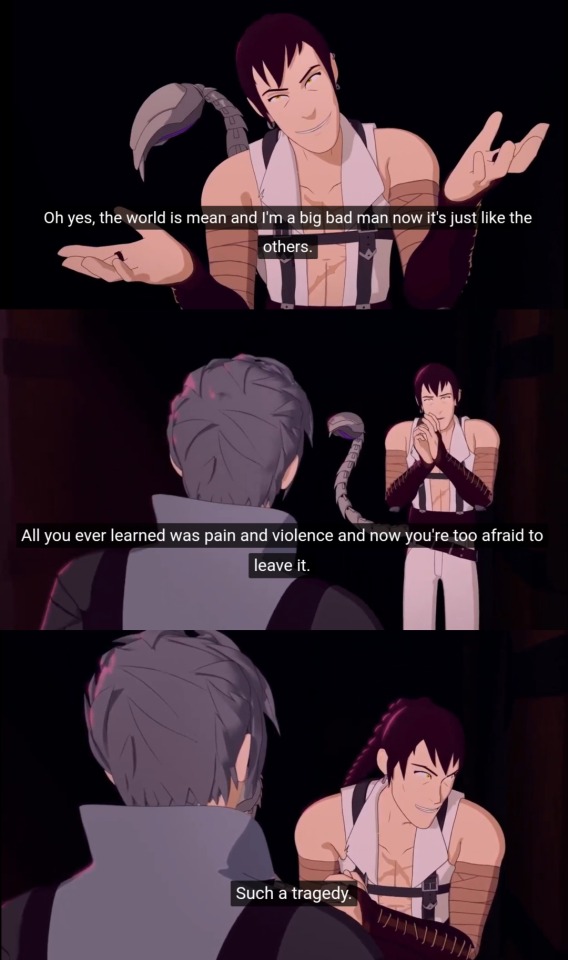
Making a more direct comparison between both fighters, Tyrian far surpasses Neo in terms of strength, speed, reaction and durability: he was able to support from an impact that caused him to destroy a house without being minimally affected, he was able to easily stop a charged hammer blow from Nora, he withstood an explosion in the mouth that weakened him but he didn't knock him out, he moved fast enough for Penny to lose sight of him, and he demonstrated enough combat awareness/reflexes to fight in the dark, catch projectiles or casually block a sniper's bullets without looking, as well as having an absolute and versatile control of his 5 limbs.
He was also able to take down an angry Mercury, who had previously been able to pick a fight with Pyrrha and Yang while he was holding back and was literally able to dodge lightning bolts from the previous Autumn Maiden, and he was shown to be able to hold a fight against multiple targets at once as seen in his fight with Qrow and Team RJNR and later, against Qrow, Clover and Robyn for a time.
Neo on the other hand, it wasn't until Volume 8 that she was shown to be able to defend himself against more than one fighter as before that, she was unable to secure the relic against JNOR until Atlas' agents created a distraction. Her perception in combat isn't bad at all but she was taken by surprise when Ruby opened his umbrella and took her out of the airship at the end of V3, she was unable to dodge the badly injured Oscar's blow when she encountered with the JNR and it was also shown that she isn't immune either to manipulation, since during his fight with Ruby at the end of V8 where she was able to trick her into attacking her and then make her fall over the edge using his semblance.
His durability hasn't proven to be a big deal either due to the lack of feats, at most he could resist Yang and Cinder's fire projectiles although for this required Hust and also depended on the setting and context, not like Winter, for example, who had to withstand direct blows. As for speed, it is somewhat doubtful since at first, she was able to evade Yang's attacks in V2 but when she fought against Ruby armed in V3, she proved to have more difficulty until she was assisted by Roman and couldn't keep up with Cinder when she went completely on the offensive and even without using her semblance, powers or weapons, although she was then able to defend herself against Ruby and Blake at the same time, which implies an improvement but going back to her fight with Maria, despite being an old lady, she was able to stop all of their blows and even return a couple.
In terms of fighting style and weapons, Neo has shown a preference for blocking and dodging blows, when he has tried a more direct combat he has shown that he loses advantage, Tyrian on the other hand is someone who is direct in his attacks but also very agile and brutal in his movements. Neo has a Hust but Tyrian has the Queen's Servants and his stinger that give him range options that Neo doesn't have, in addition to Neo usually taking advantage of his combat style to tense his opponents, taunting and making them impatient so that they lose focus but knowing since he is Tyrian, it would hardly affect him and he is more likely to continue fighting without loss his mind (more, I mean) unless she managed to hit accurately him like Qrow.
Now here comes the main course: Neo's semblance, the reason why I think she won the poll. In itself, it was already amazing but with the evolution it had in Volume 9, as I said, it makes it super effective against vulnerable opponents like Ruby or Curious Cat but it also depends on the context. Ruby was caught by surprise being alone while she was going through her lowest moment, it is assumed that Cinder was the one who provided her with information about her history with characters like Pyrrha or Clover, while Curious Cat had just been crushed by Team RWBY, leaving them in a state of weakness and vulnerability where theirs would have succumbed to anyone's attack. [PLUS]
Even if Neo would create clones to help him, again, Tyrian has proven to have not problems fighting several people at the same time, he has a 360° defense thanks to his tail, his long-distance weapons would allow him to ward off or even destroy opponents and surely it wouldn't affect him to slaughter someone just for looking like his companions, at most Salem could make him doubt but Tyrian isn't naive, as I have said, he is more cunning and perceptive than he appears, for not to mention that we don't have indication that Cinder may have shared information about him with Neo as he clearly did with Ruby, so even if he became aware of his devotion to Salem, he hasn't way of knowing the lengths to which he goes or his previous failures to use against him.
Honestly, I think that a fight between these two could be very interesting because, without a doubt, both are notable in their own right: both are cunning, agile, sadistic and very maneuverable but not exempt from being carried away by their emotions, but returning to the initial topic my conclusion it would be this;
If Tyrian and Neo had a fight before the events of Volume 9, Tyrian would win without a problem, perhaps with more or less resistance but in the end he would overcome her, especially if he uses his own semblance with her, since then he would only need to land an accurate blow to Neo to leave her defenseless, injured or out of combat.
But if they were to face each other after Neo's semblance evolved, things would become more complex as additional factors would now have to be taken into account, such as the context of the scenario, as it could be a great advantage for Neo if he managed to catch Tyrian off guard as happened in his confrontation against Qrow, Clover and Robyn, but it depends on the strategy he applies as he could progressively lose that advantage as happened with Cinder if he doesn't take proper advantage of it, so she would have a better chance of putting up a longer fight.
Still, based on all of the above, I still hold my position and consider Tyrian a superior fighter in almost every aspect. This is just my opinion so if anyone wants to add anything else, they are free to do so as long as they are respectful.
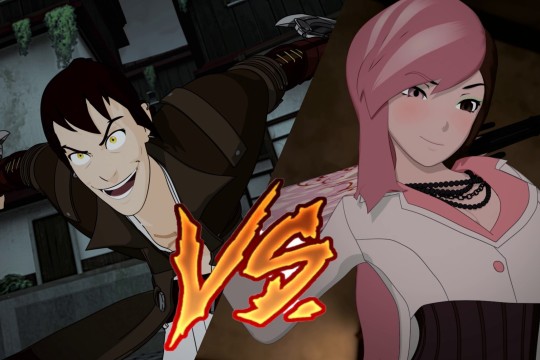
#rwby fandom#rwby tyrian#rwby neo#rwby volume 4#rwby volume 8#rwby volume 3#rwby volume 2#rwby volume 9#rwby volume 7#rwby volume 6#tyrian callows#neopolitan#roman holiday#vs#rwby#rwby volume 10#rwby v10#rwby v7#rwby analysis
17 notes
·
View notes
Text
Tuesday, January 16, 2024
Another day of frigid wind chills and brutal cold across much of the U.S. (AP) Brutally cold temperatures and dangerous wind chills stayed put across much of the U.S. Monday, promising the coldest temperatures ever for Iowa’s presidential nominating contest, holding up travelers, and testing the mettle of NFL fans in Buffalo for a playoff game that was delayed a day by wind-whipped snow. About 150 million Americans were under a wind chill warning or advisory for dangerous cold and wind, said Zack Taylor, a meteorologist with the National Weather Service in College Park, Maryland, as an Arctic air mass spilled south and eastward across the U.S. Sunday morning saw temperatures as low as minus 20 degrees Fahrenheit (minus 6.7 degree Celsius) to minus 40 F in northern and northeast Montana. Saco, Montana, dropped to minus 51 F (minus 26 C). Subzero lows reached as far south as Kansas, Missouri, Illinois and parts of Indiana, Taylor said.
Migrant deaths in Rio Grande intensify tensions between Texas, Biden administration over crossings (AP) After Texas fenced off a park along the U.S.-Mexico border and began turning away Border Patrol agents, Republican Gov. Greg Abbott explained why at a campaign stop near Houston. “We are not allowing Border Patrol on that property anymore,” Abbott said Friday, drawing applause from supporters. He relayed frustration over migrants illegally entering the U.S. through the border city of Eagle Pass and federal agents loading them onto buses. “We said, ‘We’ve had it. We’re not going to let this happen anymore,’” Abbott said. Later that night, the U.S. Department of Homeland Security said three migrants, including two children, drowned near the park after Texas officials “physically barred” Border Patrol agents from entering. Mexican authorities pulled the bodies, each of them wearing jackets, from the water on the other side of the Rio Grande.
Guatemala’s New President Is Sworn In, Despite Efforts to Stop Him (NYT) Despite staunch resistance from his opponents in the government, the anticorruption crusader Bernardo Arévalo was inaugurated early Monday morning as Guatemala’s president, a turning point in a country where tensions have been simmering over widespread graft and impunity. His inauguration had been scheduled for Sunday, but members of Congress delayed it, and concerns persisted about whether it would happen at all. But after an international outcry and pressure from protesters, Mr. Arévalo was sworn in shortly after midnight, becoming Guatemala’s most progressive head of state since democracy was re-established in the 1980s. His rise to power—six months after his victory at the polls delivered a stunning rebuke to Guatemala’s conservative political establishment—amounts to a sea change in Central America’s most populous country. His landslide election reflected broad support for his proposals to curb graft and revive a teetering democracy. But as Mr. Arévalo prepares to govern, he must assert control while facing off against an alliance of conservative prosecutors, members of Congress and other political figures who have gutted Guatemala’s governing institutions in recent years.
Columns of tractors gather in Berlin for the climax of a week of protests by farmers (AP) Columns of tractors rolled into Berlin on Monday as farmers gathered for the climax of a week of demonstrations against a plan to scrap tax breaks on the diesel they use, a protest that has tapped into wider discontent with Germany’s government. Over the past week, farmers have blocked highway entrances and slowed down traffic across Germany with their protests, intent on pushing Chancellor Olaf Scholz’s government to abandon the planned cuts entirely. The farmers’ protests come at a time of deep general discontent with the center-left Scholz’s government, which has become notorious for frequent public squabbles and lengthy wrangling over sometimes poorly communicated decisions. Scholz acknowledged concerns that go well beyond farming subsidies, saying that crises, conflicts and worries about the future are unsettling people.
Lava from Icelandic volcano eruption engulfs homes, roads (Washington Post) A volcano that erupted in southwestern Iceland over the weekend sent lava pouring into a nearby fishing town, swallowing up roads and setting at least three houses alight, footage shared by national broadcaster RUV showed. The volcano erupted around 8 a.m. local time Sunday after a series of earthquakes, the country’s meteorological office said. Molten rock from two nearby fissures streamed into the town of Grindavik, the agency said. “Lava is flowing into Grindavik, a thriving town where people have built their lives,” Icelandic President Gudni Thorlacius Johannesson said in an address to the nation Sunday evening, describing “tremendous forces of nature” at play. It was the first time in more than 50 years that lava had flowed over Icelandic homes, he said.
United Nations seeks $4.2 billion to help people in Ukraine and refugees this year (AP) The United Nations appealed on Monday for $4.2 billion to help people in Ukraine and displaced outside the country this year, saying that people on the front lines have “exhausted their meager resources” and many refugees also are vulnerable. About three-quarters of the total, $3.1 billion, is meant to support some 8.5 million people inside Ukraine. The remaining $1.1 billion is sought for refugees and host communities outside Ukraine. A recent wave of attacks “underscores the devastating civilian cost of the war” and a bitter winter is increasing the need for humanitarian aid, the U.N. Office for the Coordination of Humanitarian Affairs said in a statement from Geneva.
War or No War, Many Older Ukrainians Want to Stay Put (NYT) They sit in ones and twos in half-destroyed homes. They shelter in musty basements marked in chalk with “people underground”—a message to whichever troops happen to be fighting that day. They venture out to visit cemeteries and reminisce about any time other than now. Ukraine’s elderly are often the only people who remain along the country’s hundreds of miles of front line. Some waited their entire lives to enjoy their twilight years, only to have been left in a purgatory of loneliness. Homes built with their own hands are now crumbling walls and blown-out windows, with framed photographs of loved ones living far away. Some people have already buried their children, and their only wish is to stay close so they can be buried next to them. Almost two years into Russia’s full-scale invasion of Ukraine, with war at their doorsteps, older people who have stayed behind offer varying reasons for their decisions. Some simply prefer to be at home, whatever the dangers, rather than to struggle in an unfamiliar place among strangers. Others do not have the financial means to leave and start over.
After attempts to meddle in Taiwan’s elections fail, China takes stock (Washington Post) Taiwanese voters have made it clear—for the third time in a row—that they don’t want a leader who will kowtow to China. The democratic island on Saturday elected as president Lai Ching-te, the current vice president and former independence advocate whom Beijing views as a dangerous “separatist.” Now, Beijing must craft a response. For Beijing, Lai’s victory is a loss that deepens anxiety about its ability to bring Taiwan under its control, a long-held goal of the ruling Communist Party and a key part of Chinese leader Xi Jinping’s legacy. The result gives Taiwan’s ruling Democratic Progressive Party (DPP), which Beijing refuses to engage with, an unprecedented third term. “A Lai win will mean that Xi loses face,” said Chen Fang-Yu, assistant professor of political science at Soochow University in Taipei. “It means his Taiwan policy has failed. So now he must do something to show his muscle.” China’s initial response to Lai’s victory was predictable: Officials issued the usual strongly worded statements on Sunday, and Beijing’s embassies in countries that congratulated Lai condemned them for “interfering in China’s internal affairs.”
Australia celebrates Australian-born queen of Denmark (AP) A day after an Australian became queen of Denmark. her native land on Monday celebrated the unlikely fairy tale with cocktails, picnics and a “Danish Fiesta.” Mary Donaldson’s journey from Tasmania to the world’s first Australian-born queen has captivated both Danes and Australians. People gathered to mark the occasion across Australia, including Queen Mary’s hometown of Hobart, the capital of the southern island state of Tasmania. “It’s not something that happens every day that you have an Australian becoming queen. I don’t know if it will ever happen again,” Danish Club Vice President Lykka Borup told the Australian Broadcasting Corporation. Mary’s husband, Crown Prince Frederik, was proclaimed king of the European nation on Sunday, two weeks after his 83-year-old mother, Queen Margrethe II, announced she would be the first Danish royal to abdicate in about 900 years.
Grief and vengeance: 100 days of war in Israel, Gaza and the West Bank (Washington Post) It’s been three months since Hamas fighters attacked Israel, killing 1,200 people and taking about 240 hostage. In response, the Israeli military unleashed a level of force unprecedented in Gaza, killing more than 23,900 people. In the occupied West Bank, Israeli settlers have stepped up attacks on rural Palestinian communities, accelerating Arab displacement as the war and large-scale arrests fan a new generation of Palestinian militancy in the cities. Israel today is a nation heavy with shock, looking for answers and often also for vengeance. The streets are slowly coming back to life, but they feel anything but normal. Young reservists must take their weapons as they go about their business. The faces of the Israeli hostages are reproduced in shop windows and on government buildings alongside three words that are now a rallying cry: “Bring them home.” Newsstands and television screens show over and over the scenes of Hamas’s crimes. They show the Israeli army in Gaza. But they rarely show what is happening to civilians. Palestinians there are frantic and bone-tired. The pace of death is so fast, the possibility of famine so close, that residents say they have little time to mourn or to process their losses. Fear—how to survive the night, how to find a little food—is a more pressing constant. With more than two-thirds of homes now destroyed, much of Gaza is effectively gone.
Houthi rebels strike a U.S.-owned ship off the coast of Yemen (AP) Houthi rebels fired a missile, striking a U.S.-owned ship Monday just off the coast of Yemen in the Gulf of Aden, less than a day after they launched an anti-ship cruise missile toward an American destroyer in the Red Sea. The attack on the Gibraltar Eagle, later claimed by the Houthis, further escalates tensions gripping the Red Sea after American-led strikes on the rebels. The Houthis’ attacks have roiled global shipping, amid Israel’s war with Hamas in the Gaza Strip, targeting a crucial corridor linking Asian and Mideast energy and cargo shipments to the Suez Canal onward to Europe. “The ship has reported no injuries or significant damage and is continuing its journey,” the U.S. Central Command said.
Cyclone causes heavy flooding, 1 death in Mauritius after also battering French island of Reunion (AP) A tropical cyclone caused heavy flooding and at least one death in Mauritius on Monday as cars were washed away by surges of water in the Indian Ocean island’s capital city and elsewhere. A motorcyclist died in an accident caused by the flooding, the government said and imposed a curfew. The government issued an order that everyone except emergency and health workers, members of the security services and those requiring medical treatment must return home and remain there. Some people were also being evacuated as the floodwaters caused by Tropical Cyclone Belal threatened houses and other buildings. Schools were closed and hospitals were told to only keep their emergency departments open.
0 notes
Text
By • Olalekan Fagbade PDP will win, even if rerun covers entire State – Governor removed by Appeal Court boasts Governor Dauda Lawal of Zamfara has pledged to remain focused in his bid to execute development projects in the state, despite the Appeal Court judgment which declared the March 18 election inconclusive. Lawal stated this when he addressed a group of party faithful in Gusau shortly after his return from Abuja. He called on supporters to remain calm and law-abiding, saying the Peoples Democratic Party (PDP) would emerge victorious, even if the rerun was to cover the entire state. “We have nothing to worry about; we know that the people voted for us before, and they are still ready to vote for us again. “Our determination to rescue the state is intact, as you can see a number of ongoing developmental projects across the state. “Our aim is to change the narrative of our socioeconomic development,” he said. On his part, the state PDP acting Chairman, Muktar Lugga, lauded the party faithful for coming out en masse to welcome the governor. He said the rally demonstrated love and loyalty to the state administration. DAILY POST recalls that the Court of Appeal sitting in Abuja had declared the governorship election held in Zamfara on March 18, inconclusive. The three-member panel led by Justice Oyebisi Folayemi and supported by Justice Cordelia Ifeoma Jombo-Ofo and Justice Sybil Nwaka Gbagi nullified the return of Lawal (PDP) as the winner of the governorship poll. The court ordered a fresh election in three Local Government Areas where elections had not been held previously, or results from various polling units were not counted.
0 notes
Text
#sorry but i had to do this#like seriously sir#zhu yilong#if you wanted us not to be stuck on your performance as shen wei#you shouldn't have made him so incendiary#and that's that on that#which this poll will shortly demonstrate#tumblr polls
17 notes
·
View notes
Video
youtube
Happy 48th Birthday Musician Finley Quaye, born 25th March 1974, Edinburgh.
Quaye comes from a musical background with Ghanaian lineage - his father was the jazz singer/pianist Cab Kaye, while his brother Caleb Quaye played guitar for Hookfoot and Elton John in the 70s, followed by a stint with Hall And Oates in the 80s. Quaye was raised in Manchester and on leaving school he returned to Edinburgh, where he worked as a paint sprayer, and often drove to Newcastle to attend gigs by artists such as 808 State and Soft Cell.
Moving back to Manchester, he embarked on a BTEC course in music and sound engineering, but did not complete his tuition. He briefly relocated to London where he joined the Donga Tribe and practised drumming. His aspirations towards a singing career began when he returned to Manchester, where he voiced a track for A Guy Called Gerald in one take. Shortly after the session, he returned to Edinburgh, where he unexpectedly heard the track on the radio, and subsequently began listening to dub music. His initial inspiration came from an unorthodox source, the New York-based avant-gardist John Zorn’s ‘Black Hole Dub’, although he was later inspired by more conventional performers.
Quaye recorded his first solo outing on a four-track tape, singing and playing drums, bass and guitar. In March 1997, he released the Ultra Stimulation EP, which demonstrated his diverse influences, including Charles Mingus, Jimi Hendrix and Bob Marley. He also embarked on the live circuit, debuting at Bristol’s Malcolm X centre, where he supported Luciano.
In June, he released ‘Sunday Shining’, which gave a nod to Bob Marley’s ‘Sun Is Shining’, as well as other reggae hits including Dennis Brown’s ‘Money In My Pocket’. The song, delivered in a style similar to that of a young Burning Spear, became his first UK chart hit and Quaye’s unique approach was much lauded by the critics. The promotional wheels were set in motion with appearances at the major summer festivals, including the Essential Roots Day alongside Everton Blender, Cocoa Tea and Anthony B. in Finsbury Park, London, and the release of his debut album. Further chart success followed with the singles ‘Even After All’, ‘It’s Great When We’re Together’, and ‘Your Love Gets Sweeter’, and he was voted Best Male Singer at the 1998 BRIT Awards.
I wish I could say Leither, Quaye had gone from strength to strength, but he has had a troubled life since then, appearing in several courts on various charges after unsavoury incidents, one was over an argument over Game Of Thrones. He was once booed off stage halfway through a performance at a Madness festival in 1998, billed as a pre World Cup bash, Finley endeared himself to the English partisan audience by making derisory statements concerning the England football squad’s likely performance in the competition, just normal Scottish banter, but the English didn’t see it that way!
In 2015 he played a gig in Gloucester, not turning up for the soundcheck, eventually the gig began at 9pm and Quaye started playing with his back to the audience, the gig promoter appeared and ended it, kicking him off stage telling the audience he had never seen a man act so unprofessionally and telling them he would refund their money. In 2019 he was ordered to carry out 200 hours of unpaid work for punching a bar manager and threatening to stab him during an unprovoked drunken attack.
Last February he was convicted of of criminal damage after he admitted throwing sign through a bus door during a row over a fare that happened in 2020.
He is back on stage this year, as he celebrates the 25th Anniversary of his double-platinum debut album Maverick A Strike at Edinburgh’s Liquid Rooms on Wednesday 1st June and Glasgow’s Oran Mor on Thursday 2nd June 2022, he is also playing The Garage, London on May 27th.
In a recent poll naming the Top 100 music acts from Scotland Finlay appeared at number 34.
We can only hope Finley can maybe get his head together some time in the future and start making good music again, for he is a very talented man. There are probably some of you that don’t know his music, I urge you to listen to this simple mellow song by Finley, I just wish he could be as mellow as this song is…………..
Even after all The murdering Even after all You’re suffering sow You know I love you so You know I love you so and so Even after all All that you go on, sir Is the order of the day And all that you believe, sir Is the order in this society You know I love you so You know I love you so and so Even after all This is my manner y'all Man just feel satisfied No competition No competition at all I just feel satta star Them eyes are gorgeous girl No demise, upraise I got to raise it again Them eyes are gorgeous I must advance I don’t check for no superficial It’s got to be beneficial These sonic fruits These sonic fruits Sights These sonic fruits Got them moving around alright Hyper play Steppin’ and rising Even after all The murdering that go on Even after all, oh no Your suffering sow You know I love you so You know I love you so and so Even after all You just survive soldier And your soul is beautiful And your soul is good
10 notes
·
View notes
Link
When it was announced earlier this month that President Donald Trump was hospitalized with COVID-19, there was a chance that maybe, just maybe, he would finally start taking this pandemic seriously.
Fat chance.
Shortly after leaving Walter Reed Medical Center (where the president, a critic of "socialized medicine," got the finest medical treatment that government can provide), Trump was back on his bullshit — holding massive rallies across the country, where thousands of his supporters gathered, many not wearing masks, as if the whole thing never happened. As this week's issue went to press, Trump was expected to bring another one of his superspreader events to Michigan, with a rally scheduled for Tuesday, Oct. 27 in Lansing — a week before the Tuesday, Nov. 3 general election — because apparently Trump doesn't care if Michiganders die.
On Friday, the U.S. reported its highly daily number of coronavirus cases, with at least 81,400 new cases reported. More than 222,000 Americans have died from the virus so far. In Michigan, more than 7,522 people have died from COVID-19.
If you're sick of Trump's plague, there's something you can do about it. Vote for Democrats Joe Biden and Kamala Harris for the presidential ticket, and Gary Peters for Senate, on Tuesday, Nov. 3.
That's not all that's on the ballot. We also have an opportunity to move the Michigan Supreme Court to the left (by voting for Bridget Mary McCormack and Elizabeth Welch). There are also two state ballot proposals: Proposal 1 (a constitutional amendment that would allow money from oil and gas mining on state-owned lands to continue to be collected in state funds for land protection and creation and maintenance of parks) and Proposal 2 (which would require a search warrant in order to access a person's electronic data or electronic communications). In Detroit, voters can weigh in on Proposal N (which would allow the City of Detroit to sell $250 million in Neighborhood Improvement Bonds to preserve and renovate 8,000 homes and remove another 8,000 blighted homes). —Lee DeVito
What you need to vote
Simply show up in person to your local polling place on Tuesday, Nov. 3. Bring a photo ID, such as a driver's license, identification card, or U.S. passport. If you don't have an ID, don't worry. You can fill out a brief affidavit stating that you're not in possession of a photo ID. Your vote will still be counted.
Don't forget your face mask, although it's not required at polling stations. It wouldn't hurt to bring some hand sanitizer or gloves, too. And don't forget social distancing. You'll likely be standing in a long line and encountering election workers. You may also want to bring a personal cheat sheet to remind yourself how you're voting. Even the most astute voters may not be familiar with all of the races, especially the judicial ones.
To find your polling place and preview your ballot, visit the Michigan Voter information Center at michigan.gov/vote. Polling places are open from 7 a.m. to 8 p.m. on Election Day, Tuesday Nov. 3. If you're in line to vote at 8 p.m., you have the right to cast your vote. If you're still in line at 8 p.m. and someone tries to send you home and deny you your right to vote, don't take no for an answer. Ask for a supervisor and an on-site voting advocate.
Anyone who is registered to vote may cast an absentee ballot in Michigan. Michigan expects a record number of absentee voters in November because of the coronavirus. More than 2 million voters have already requested an absentee ballot. —Steve Neavling
Voting deadlines
We've been trying our best to keep our readers up to date with the various deadlines for the election, considering all the chaos of 2020 — you know, a pandemic, civil unrest, Trump's suspiciously timed cuts to the U.S. Postal Service, yadda, yadda, yadda — but it turns out things are a bit more complicated than we thought they were.
See, in 2018 Michigan voters approved Proposal 3, which was supposed to make it easier to vote by allowing for no-reason absentee voting and other changes. And it does — but there are quite a few different scenarios to consider, and they all have various deadlines.
Reader Jordan Smellie would know. Smellie's an elections specialist for the City of Ferndale.
"Proposal 2018-3's changes to the constitution made things much better for voters by adding a lot of flexibility, but the downside of that is that it created a staggered series of nuanced deadlines that have proven very difficult for anyone to keep straight, and even more difficult to summarize gracefully," Smellie tells us via email.
Graciously, Smellie has provided us with a more detailed timeline, which we have edited lightly for style. We hope this helps you as much as it helped us.
Your deadlines for the upcoming general election are:
Friday, Oct. 30 (5 p.m.): If you're getting an absentee voter ballot for this election, your local Clerk can't mail it to you after this time. But you can still get an absentee ballot in person at your local city or township hall.
Saturday, Oct. 31 (2 p.m.): If you made a mistake on your ballot or changed your mind, your local Clerk can't mail you a replacement ballot after this time. You can still get a replacement ballot in person at your local city or township hall.
Sunday, Nov. 1: The last day you can pick up an absentee voter ballot and take it home with you.
Monday, Nov. 2: You can still get an absentee voter ballot in person, but you have to vote in your local city or township hall. Just like on Election Day, you can't take your ballot out of the room.
Monday, Nov. 2 (10 a.m.): If you've already turned in your ballot, you can't change your votes after this time. (If you're voting in your local Clerk's office today and you make a mistake, you can still receive a replacement ballot.)
Monday, Nov. 2 (4 p.m.): Your local Clerk can't issue absentee ballots to anyone for any reason after this time. (If you're already in the room at 4 p.m., you will be served by staff.)
Tuesday, Nov. 3: Election Day. Polls are open from 7 a.m. to 8 p.m. All absentee voter ballots must be signed and in the Clerk's possession by 8 p.m. in order to be counted.
To make sure your ballot arrives in time, you should not send it by mail. Instead, you should drop it off at your local Clerk or at a designated ballot drop-box. You can find the addresses for both, as well as the answers to any other questions you might have, at michigan.gov/vote. —Lee DeVito
Officials warn of potential violence
Michigan is among five states with the highest risk of right-wing militia violence during and after the election, according to an alarming new report from a nonprofit that tracks political violence.
The Armed Conflict Location & Event Data Project (ACLED) examined the activities of more than 80 militias across the country and concluded that Michigan is at a heightened risk, based on active militia training, anti-coronavirus lockdown rallies, and the presence of the Proud Boys, the far-right brawlers whom President Trump told to "stand back and stand by."
Michigan is home to several active militias, including Michigan Liberty Militia and the Michigan Home Guard.
"In light of this activity, tensions run high" in Michigan, the report states.
Battleground states such as Michigan also run a higher risk for violence. Trump won by just 0.2% in 2016, or some 10,000 votes.
The report highlights the arrests of 14 men accused of plotting to kidnap Gov. Gretchen Whitmer and attack the state Capitol and law enforcement, with the goal of instigating a civil war.
Among the warning signs for militant activity are protests against states' coronavirus lockdowns. In April, hundreds of armed protesters stormed the state Capitol in Lansing, and the rallies were among the first in the nation. An analysis of Black Lives Matter rallies found that counter-protesters, including the Proud Boys, were often involved, sometimes clashing with demonstrators. On Aug. 15, for example, the Proud Boys clashed with supporters of the anti-fascist Michigan People's Defense League and Black Lives Matter movement.
In May, armed militia members pledged to block police from forcing the closure of an Owosso barber shop that opened in defiance of Michigan's stay-at-home order.
Michigan officials are taking precautions. Michigan Secretary of State Jocelyn Benson recently banned guns near polling locations, and Attorney General Dana Nessel said state troopers will be sent to polling places in counties where officials fear local sheriffs may not enforce voter intimidation laws.
The report concludes that the "trends raise significant concerns for the security of the election period."
"It is yet unclear how many of these groups will react, no matter the vote's outcome," the report states. "Does a Trump loss lead to anger at the system and a backlash against what is deemed a stolen election? Does a Trump victory further empower groups that see him as a supporter, including through verbal encouragement ahead of the election? The answers to these questions are as numerous as they are uncomfortable."
Three gun-rights groups have filed a lawsuit against Benson to nullify her ban on openly carrying firearms at or near polling locations on Election Day.
Michigan Open Carry, Michigan Gun Owners, and Michigan Coalition for Responsible Gun Owners argue that Benson's directive violates state law and harms residents who want "to exercise both their 2nd Amendment right to self-protection and their fundamental right to vote."
"Nowhere within Michigan's Constitution is the office of the Secretary of State empowered to issue directives regarding the time, place or manner of elections," the suit said. "Indeed, those powers are specifically limited to the Legislature."
The groups are asking a judge to issue an injunction to suspend Benson's order before Election Day.
The Michigan Association of Chiefs of Police also criticized the order, arguing that it does not give police "the authority to enforce the Secretary of State edict." On Tuesday, after this week's issue went to press, a Michigan judge struck down Benson's gun ban at polling places. —Steve Neavling
When will we know the results?
Don't bother staying up late on Election Day, because officials in Michigan say it's going to likely take longer than usual to count all the ballots. Be patient!
That's because of the unprecedented volume of mail-in ballots local clerks are reporting in Michigan, as is the case in other states, due in part to the pandemic. In 2018, Michigan voters approved no-reason absentee ballot voting.
Several local officials held a Zoom meeting on Thursday to explain the situation. In Hamtramck, City Clerk August Gitschlag said the tiny two-square-mile city has already seen seven times the typical number of absentee ballots. Due to state law, however, they can't start counting the ballots until Election Day.
"We've been working round-the-clock to process absentee applications and send out ballots," Gitschlag said. "But we don't have the infrastructure to keep up with the overwhelming demand. We will count every vote, but being right is more important than being fast. I want to urge everyone to please be patient."
Assistant Secretary of State Heaster Wheeler said municipalities across the state are seeing similar spikes.
"We see every sign that this will be a high-turnout election all across Michigan," Wheeler said. "Secretary of State [Jocelyn] Benson and our team are working incredibly hard to make sure that every vote is counted fairly, efficiently, and accurately. We're going to get this right." —Lee DeVito
15 notes
·
View notes
Text
animaniacs - s1e58: meet john brain

man, season 1 just goes on for forever, huh?
episode summary: brain decides he’s sick of Silly Plans That Don’t Work and runs for president instead. this is the only sensible thing he’s done all series.
the rundown:
we open at brain painting on a big canvas.

obviously he’s mouse sized, so he needs a complicated mechanism made out of office supplies to help him reach the tall bits. i’m not sure why he didn’t just put it on the floor? maybe he just didn’t want to get dirty.
“what’s tonight’s plan to take over the world, brain? a gizmo? a thingy?”

“your scientific jargon staggers me, pinky, but tonight, we will not rely on science. but rather, we will play the world’s game.”

“do you know what that game is?”

“um. mystery date? twister?”
pinky just loves twister, apparently! so much so that he decides to demonstrate to brain how it works. good thing he wasn’t doing anything important!

oh dear. “the... cable, pinky, the cable--”


lol.
once they manage to pick themselves up off the floor, brain informs pinky that the world’s game is politics, and he plans to win this game by running for president.
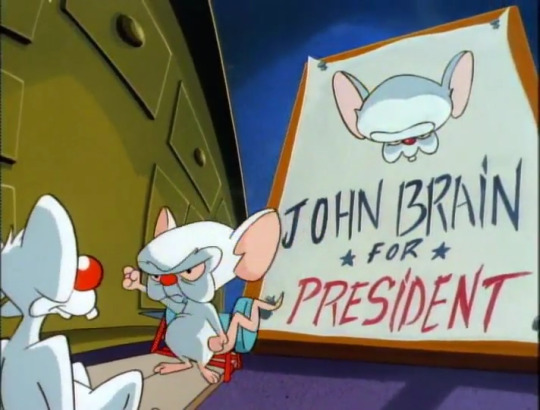
i’m not.... entirely sure what’s up with the animation in this episode. they just kind of look funny??? i couldn’t place why, it’s just... odd.

“and once i am ensconced in the white house, i will take over the world!”
which is usually where pinky would cut in with a BRILLIANT BRAIN BUT WAIT WHAT IF THE USPS GETS DISBANDED but.... instead he just says “naaaaaaaaaarf”, which doesn’t really help, but sure.

so we cut to larry kling, live, (left) with susanne slimmers (right) and the thigh monster (middle). larry is taking calls, apparently, and the first call they get is a woman asking susanne how she stays looking so good.
personally, she looks horrifying (kind of like that lady back in bubba bo bob brain?) but she attributes it to the aforementioned thigh monster, complete with a demonstration.



“i could watch that all day.”
okay, weirdo. the second caller is brain.

“my name is john brain.” he says, very cutely, in his little mouse suit. where does he get so many little suits? this is a completely different one from the world can wait.
“while i admire susanne’s interests, i am here for another purpose.”

“and what purpose might that be?”

“i would like to announce my candidacy for president of the united states.”

“you’re running for president, mr brain-- why are you doing that?”
why indeed. brain informs him very honestly that he intends to take over the world, and they both laugh at him.

so there’s that. “keep that sense of humour”, says Human Larry. “you’ll need that on the campain trail.”
still, brain is undeterred.

as this weirdly proportioned man tells us, brain is speaking “to reporters through remote broadcast any minute now.” he’s a lot timelier today than he is in “yes, always”, and appears shortly afterwards.

“good evening, ladies and gentlemen of the press.” cute! but exclusionary. “your questions?”

that sure is a lot of questions. jeez.

“mr brain, have you chosen a running mate to be your vice president?”

“yes, i have. meet admiral pinky.”

“narf!! hee hee hee what am i doing here???”

“naaaaaaaaaaaaaaaaaaaaaaaaaaaaaaaaarf.”

“mr brain, why have you not yet appeared in public?”
“i’m working on my plan for the presidency.”

“uh huh. and what might that be?”

“cut the deficit, lower taxes, and then take over the world.”

you can’t really tell in this screenshot, but everyone here is laughing, because they find world conquest hilarious, i suppose.

and hell yeah! so do the Average Americans, Like You And Me. Excellent.

“i like him.”

“mr brain, you appear to have very large ears, a red nose, and fur growing on your head. there are concerns about your health.”

“i’m as healthy as any mouse! as long as i stay away from cats. ha ha ha.”
you’re, uh, not going to mention the tail broken in three places then, i guess. despite the fact that he is very obviously a mouse, the Average Americans Like You And Me decide that he must be speaking metaphorically, the “mouse” being him, the little guy, and the “cats” being the fat cats that usually get into politics. he’s an Average American! Like You And Me!

they like him!
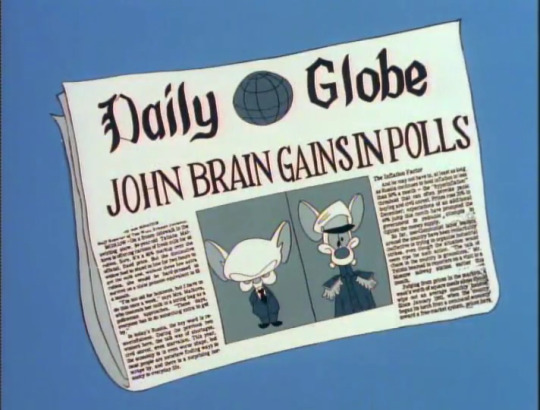
everyone likes him, it seems.
conclusion:
so brain manages to convince everyone, through a comedy of errors, that he is for the finer tenents of american society.

“when i take over the country, everyone will work for me.”
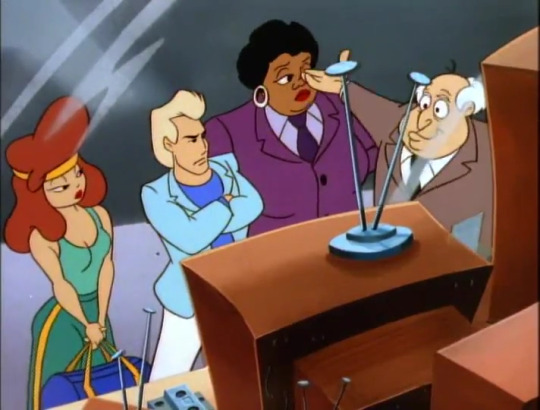
“he means jobs! jobs for everyone!”

“if people oppose me, i’ll teach them a lesson.”

“thank goodness he’s for better education!”

“so surrender quietly and nobody will be hurt.”

“yes! healthcare!”
so, being classically unable to spot the terrifying dictator* in their government, america universally decide they like john brain, and now he’s leading in the polls.
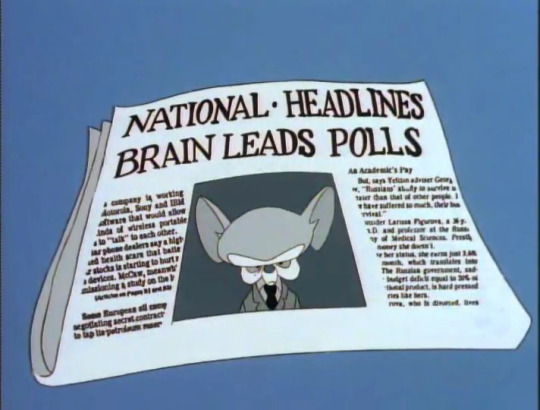
good for him. *yknow, i’m pretty sure brain’s policies aren’t usually that bad? i was definitely under the impression that he wanted to rule the world to make it a better place? maybe this is before the Character Development got to him.
or it’s just funny, i guess.
anyway brain is doing well enough that he decides to make his first public appearance, which is a bold move.

“it’s time to meet john brain!” it’s probably more that he just needed a first name to be president, but.... maybe his name was john this whole time and he just doesn’t use it because it’s not as glamourous and terrifying. “i am the john. you are under my control” like it just doesn’t scan. whatever.

but anyway, he’s making a big thing of it.

WE WANT JOHN BRAIN WE WANT JOHN BRAIN
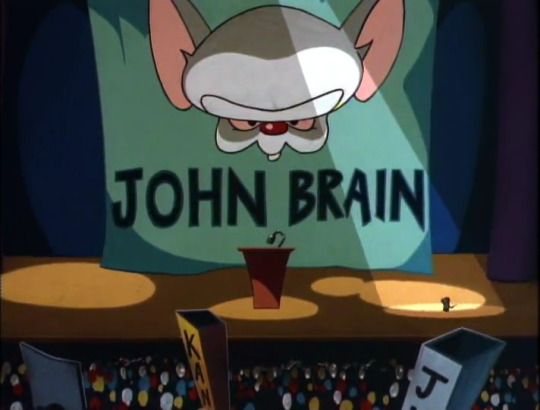
and here he is!

hm.

“greetings!”

“he really is a mouse!”

BOOOOOO BOOO BOOOOOOO BOOOO. HISS. BOOOO

BOOOOOOOOOOOOOOOOOO. BOOOOOOOOOO. BOOOOO.
i don’t know how these people didn’t notice beforehand, but, yknow, whatever.

“but-- please, when i take over i promise to rule in a fair and just manner--”

donk.
and then everyone runs away, i guess.


this is just really sad.
brain: 3 ½ pinky: 5 ½ outside influence: 6

“mistah bwain, you’ve captivated the voters’ common sense, but what about you personally? are you married?”

“yes! allow me to introduce my lovely wife, pinkinia.”

“hello barbara! zort! i am woman, hear me roar!”

“aaahahahahahahahaha narf!”

#a!#patb#animaniacs#pinky and the brain#this was a sad episode!!!#he did everything right!!!!#poor lil bean!!!#this does not bode well for his future career lol
20 notes
·
View notes
Link
via Politics – FiveThirtyEight
The recent protests against police brutality are some of the largest and most widespread in American history. An estimated 15 million to 26 million Americans have taken to the streets to protest police violence and advocate for Black lives.
The remarkable size and scope of these demonstrations has translated into real policy gains, too. Dozens of state and local police reforms have been enacted since the protests started. And at the federal level, President Trump signed an executive order that outlines his administration’s priorities for police reform, including creating a national database that catalogues police misconduct. The House of Representatives passed an even more ambitious piece of legislation that proposes a series of reforms, like tying federal funding to bans on chokeholds and setting up a task force to address excessive police force, but the GOP-controlled Senate hasn’t taken it up.
Arguably, though, the protests’ impact on public opinion has been even more immediate and wide-ranging. Unfavorable views of the police, acknowledgement of widespread discrimination against African Americans and support for Black Lives Matter all jumped up by at least 10 percentage points, according to tracking polls conducted shortly before and after the protests by both Democracy Fund + UCLA Nationscape and Civiqs.
These changes in public opinion are being driven in large part by white Americans, who for years have been much less likely than Black Americans to acknowledge that racial inequality remains a real problem. Since the first wave of large-scale Black Lives Matter protests in 2014, white Americans’ racial attitudes have gradually become more liberalized while Black Americans’ views have remained relatively steady.
Trump’s many offensive statements may be contributing to this trend, as they seem to be driving Democrats, particularly white Democrats, to adopt more liberal views on race in response. That’s one reason so many white Democrats showed up at the most recent protests.
But the protests’ impact on public opinion appears to be fading — particularly among white Americans, as you can see in the chart below. Black Americans’ opinions have stayed much steadier, as they have in the past.
Drawing on data from the Democracy Fund + UCLA Nationscape’s weekly tracking surveys, I found that unfavorable views of the police are trending back down toward their pre-protest levels among white Americans and have dipped among Black Americans. White respondents are also becoming somewhat less likely to say that African Americans face “a lot” or “a great deal” of discrimination, though those numbers remain higher than they were before before George Floyd was killed in May. Black Americans’ views on the discrimination they face have remained essentially unchanged.
The same patterns are evident in tracking surveys from Civiqs and YouGov/The Economist. In the Civiqs data, white respondents’ net support (support minus opposition) for the Black Lives Matter movement surged from -4 shortly before the protests to +10 in early June, but has since dropped to 6 points underwater. Meanwhile, Black Americans’ net support went from +76 in early May to +85 in early June and has remained within a point of that mark ever since. And in the YouGov/The Economist surveys, the share of white Americans who said racism is a big problem decreased from 45 percent in June to 33 percent when the question was last asked in early August. Three-quarters of Black Americans, on the other hand, said racism was a big problem in both surveys.
Why, then, do white Americans’ views on racism and the police seem to be returning to their baseline, but Black Americans’ views remain steady? Well, as media attention turns away from the protests, it may simply be easier for white people to forget about the issue, while the stakes were always greater for Black Americans.
In an analysis of closed captioning data of cable news broadcasts from the TV News Archive,1 we found a huge spike in the number of clips that mentioned “racism” or “Black Lives Matter” as the protests raged during the first two weeks of June. But, as you can see in the chart below, the amount of attention cable news paid to racism and the Black Lives Matter movement has dropped as we’ve moved farther away from peak protest activity. (Coverage of these two issues is still higher than it was prior to Floyd’s death, however.)2
This surge and decline in media attention clearly corresponds to changes in public opinion among white Americans, and it’s possible that some of the historic gains we’ve seen in white views of the Black Lives Matter movement might not last.
This drop is not surprising, since we’ve seen it before in how public opinion changes on school shootings, for example. Because media attention on even the most high-profile mass shootings tends to be fleeting, so are these shootings’ effects on public opinion. And now, white Americans’ opinion of the Black Lives Matter movement may be following the same trajectory. That’s driving a decline in overall public support even as Black Americans continue to back the movement at very high rates.
This decline in public opinion is consistent with a long line of political science research that tells us that the effects of events on public opinion tend to last only for as long as they are at the forefront of the country’s — or, in this case, one group’s — collective consciousness. That also means that without prolonged activism and sustained media attention, the impact of this year’s protests on white public opinion could evaporate entirely.
5 notes
·
View notes
Text
ATTENDING THE INTERNATIONAL SECURITY CONFERENCE in Munich over the weekend, J.D. Vance continued his criticism of Ukraine’s defensive war against Russia (“there’s no clear end point,” Vance said). Fully embracing his role as a MAGAer-than-thou Republican, the junior senator from Ohio has repeatedly made headlines in recent months for his militant opposition to military aid for Ukraine—and, in particular, for a blatantly misleading memo he sent to every Senate Republican last week asserting that the Ukraine aid bill contained a provision that could lead to a new Trump impeachment in 2025 for trying to negotiate peace. Vance also earned plaudits from Sputnik, the Russian propaganda network, for telling Tucker Carlson that Ukraine needed to be defunded for its own good, since Democrats “want to fight Russia to the last Ukrainian drop of blood.”
Given his stance and his prominence on U.S. policy toward Ukraine, it’s worth taking a moment to look back on a Vance tweet from February 9 riffing on Carlson’s much-hyped interview with Vladimir Putin:

If you read this tweet and come away bewildered because you’ve never heard of “Duglas Makki” and because Vance appears to be criticizing the Putin regime and Carlson, you’re not the crazy one. The tweet is a troll job. And if you dig into what it means, you’ll better understand why this MAGA senator is parroting vile Kremlin talking points about Ukraine.
THERE IS NO “DUGLAS MAKKI.” The reference is to Douglass Mackey, whose alter ego “Ricky Vaughn” was a notorious alt-right social media figure during the 2016 presidential campaign. In January 2021, shortly after Joe Biden’s inauguration, Mackey was prosecuted for election interference. The charges stemmed from posts on Twitter—where he had 58,000 followers and was rated a major election “influencer” by MIT Media Labs—urging Hillary Clinton supporters to vote by text message. (There is, of course, no such option.) What’s more, the tweets were specifically geared to black and Latino voters. In March of last year, Mackey was convicted by a federal jury in Brooklyn.
Why does Vance know or care about Mackey? Because he’s a cause célèbre on the right.The narrative pushed by Carlson, erstwhile presidential candidate Vivek Ramaswamy, and many others is that Mackey’s prosecution was not only a dangerous assault on free speech but an outrageous demonstration of double standards. He was punished, his defenders say, for mocking Clinton supporters by inviting them to vote by text message and implying that they’re stupid enough to fall for such a scheme—while a left-wing Chinese-American comedian, Christina Wong, got away with the exact same joke mocking Trump supporters.
But in fact, it wasn’t even close to “the exact same joke.” Wong’s tweet, with a clearly humorous video clip in which she claimed to be “coming out” as a Trump supporter, did tell Trump voters to “skip poll lines” and “TEXT in your vote,” but gave no number to which votes could supposedly be texted. By contrast, Mackey clearly went to some trouble to make the memes he posted look like real campaign ads—complete with the Hillary for America campaign logo and “Paid for by Hillary for President 2016” fine print—and urged people to text “Hillary” to a specific number. Carlson asserted last March that “of course, in real life, no one did believe” that they could text their vote. But in fact, according to the Justice Department, nearly 5,000 people did text “Hillary” or some variation to the number in the fake ad, though we don’t know how many were actually tricked out of voting. Lastly, there was strong evidence that Mackey discussed strategies to suppress the black vote in private Twitter groups and mocked black people as dumb and “gullible.” (It’s also worth mentioning that Mackey’s “Ricky Vaughn” Twitter account was overtly white nationalist and filled with racist and antisemitic vitriol, and Mackey admitted at the trial that those were his genuine opinions at the time; in his later interview with Carlson, he described his content as merely “pro-Trump memes [and] jokes.”)
Obviously, Mackey’s repulsive speech is protected under the First Amendment. There are also some legitimate differences of opinion about his election interference case; UCLA law professor and First Amendment expert Eugene Volokh has expressed some reservations about it, partly because the federal statute under which Mackey was convicted (unlike some similar state laws) mentions violence, threats, and intimidation but not deception. For what it’s worth, Mackey’s First Amendment defense was considered by the federal court which heard the case, and was rejected in a carefully argued 56-page opinion.
One may have misgivings about Mackey’s conviction. But it’s abundantly clear that Vance’s summary of the story is extremely misleading. To say that Mackey was arrested for “making memes” is like saying that a person prosecuted for terroristic threats made by phone was arrested for making phone calls. And if Mackey is an “independent journalist,” then Alex Jones is Walter Cronkite.
THERE ARE A FEW THINGS that stand out about Vance’s “Duglas Makki” tweet.
For starters, it shows how deeply the senator is embedded in the far-right fringe. The Mackey case is so obscure outside MAGA and MAGA-adjacent circles that many of Vance’s own followers didn’t get the joke and took the story at face value.
But the context of Carlson’s trip to Russia and interview with Putin makes Vance’s reference to the Mackey case particularly repellent.
The tweet was presumably a sarcastic rejoinder to those who criticized Carlson for failing to bring up Russian political prisoners, including journalists, during his two-hour interview with Putin. See, Vance is saying, here’s a case of a journalist being persecuted for speech in an outrageous way that you’d think happens only under a dictatorship like the one in Russia—but actually, it’s right here in the USA, he’s being persecuted by the “Biden regime,” and none of the journalists dismissing Carlson as not being a “real journalist” are interested.
But to see how despicable the moral equivalency is, one need only look at some of the real cases of people persecuted and imprisoned in Russia for speech critical of the war against Ukraine or of the Putin regime.
Exactly a year ago, Maria Ponomarenko, a journalist and mother of two in Barnaul, Siberia, was convicted of spreading “fake news”—that is, posting the truth about the Russian bombing of the Mariupol Drama Theater in the spring of 2022, in which hundreds of people sheltering inside, including children, were killed. Ponomarenko’s sentence was six and a half years in a penal colony. Years, not months. Contrast to Mackey’s seven-month sentence for “memes” that evidence showed, and the jury believed, were intended to keep at least some black and Latino voters out of the voting booth.
And just four days after Vance’s tweet, Russian academic and magazine editor Boris Kagarlitsky was given a five-year sentence for a video in which he discussed Ukrainian strikes at the Kerch Strait Bridge connecting Russia to Crimea and suggested that the bridge was a legitimate military target. Convicted of “justifying terrorism,” Kagarlitsky had been initially sentenced to a 609,000-ruble fine (about $6,700) with no prison time, but the prosecution appealed the sentence as unduly lenient, which the Russian legal system allows. The court obliged. Such harsh sentences for social media posts and other expressions of dissent are no longer the exception but the rule in Putin’s Russia.
Another victim of these draconian repressions is an American journalist—a dual Russian-American citizen, Radio Free Europe/Radio Liberty editor Alsu Kurmasheva. She was arrested in October for failing to register as a “foreign agent,” a designation she and RFE/RL dispute. In December, the authorities filed additional charges of spreading “false news” about the Russian military. Kurmasheva, whose offense was the distribution of a book about Russians who oppose the war in Ukraine, may face as much as fifteen years in prison. While Carlson brought up the case of the other detained American journalist, Wall Street Journal reporter Evan Gershkovich, during his interview with Putin—and even, for once, pushed back on Putin’s evasive replies—he did not say a word about Kurmasheva. But that doesn’t seem to bother Vance, who clearly thinks this issue is a good occasion to troll “the libs.”
Back in the late Cold War, obnoxious leftists used to respond to critiques of the Soviet regime and its gulag with claims that the United States, too, had “political prisoners”—offering as examples the likes of Leonard Peltier, the Native American activist serving a life sentence for the 1975 murder of two FBI agents, and Mumia Abu-Jamal, the black activist and journalist sentenced to life without parole for the 1981 murder of a Philadelphia police officer. But now we have seen a stunning role reversal: It’s the MAGA right, including a sitting senator, that excuses and defends the Kremlin’s political repressions by trotting out faux “political prisoners” in America, be it Mackey or the January 6th rioters. The America-hating shoe is solidly on the other foot.
3 notes
·
View notes
Link
TULSA — Six members of the advance team preparing to staff President Trump’s rally here Saturday tested positive for the coronavirus, underscoring concerns about holding a massive indoor event in a city where cases are spiking.
The campaign made that announcement, saying quarantine procedures had gone into effect for the infected staff members and those in “immediate contact" with them, as hundreds of supporters filled downtown streets in anticipation of the president’s rally — his first since the virus brought much of public life to a standstill in March.
Upon entering the rally grounds, attendees were handed blue face coverings and directed through a maze of metal fencing, which led to a touchless temperature screening conducted by volunteers in purple smocks.
City police erected black fencing and other barriers around the 19,000-seat BOK Center, a private venue leased by the Trump campaign. Shortly before noon, the campaign directed officers to arrest a protester who had sat down within the barricaded zone, according to the police department.
The protester, Sheila Buck of Tulsa, said she had a ticket to the event. She was wearing a shirt that read, “I can’t breathe," among the final words uttered by George Floyd as a police officer in Minneapolis knelt on his neck.
Adding to the fortified atmosphere, about 250 National Guard soldiers were on hand to supplement local authorities. Some were armed after the threat level was elevated, said Lt. Col. Geoff Legler, a spokesman for the Guard. Initially, the plan was to equip them only with batons, shields and pepper spray.
The president is heading to Tulsa at a precarious moment for his presidency. Recent polls show him trailing former vice president Joe Biden nationally and in a number of critical swing states, suggesting he has suffered politically from his handling of the coronavirus — which has killed more than 120,000 Americans — and his response to roiling demonstrations over racial injustice and police brutality triggered by Floyd’s killing last month.
The protests and the pandemic collided with Trump’s visit to Tulsa, where the number of new coronavirus cases continues to mount. The county reported 136 new cases on Saturday — marking another high for both single-day and average cases — while the state as a whole reported 331 new infections.
Most police officers, National Guard soldiers, food vendors and the vast majority of people in line chose not to wear face coverings, though Trump-branded masks dotted the crowd. The Confederate flag also appeared — all the more striking because Oklahoma was not a state at the time of the Civil War.
Margene Dunivant and her son Christian Lynch, both of Tulsa, sat on the edge of the crowd, taking in the scene.
“Everybody here is just full-on American and American Dream and hard-working, and just believes in everything America,” said Dunivant, 52. “Nowadays, it’s like you put on a Trump shirt and you’re considered racist, and it’s just wrong. We’re good people, and we love everybody."
A clashing view was also on display in Tulsa, where counteractions were planned with such names as “Dump the Trump Rally” and “Rally Against Hate.” Antipathy to the president — and objections to his insistence on gathering thousands of people indoors for a campaign event — fused with the outpouring for Juneteenth, the holiday celebrating freedom for enslaved black people.
“It’s irresponsible to say the least,” said Mareo Johnson, a pastor and the founder of Black Lives Matter Tulsa. His organization was involved in organizing a Saturday demonstration at John Hope Franklin Reconciliation Park, less than a mile from the president’s rally.
His message to the city’s black residents, he said, was, “Stay focused on what Juneteenth represents.”
The commemoration held added significance in Tulsa, a city scarred by racist violence in 1921, when a white mob killed an estimated 300 black residents and devastated an area of the city known at the time as “Black Wall Street.” The Tulsa Race Massacre unfolded in the Greenwood neighborhood, where the words “Black Lives Matter” were painted on a road in bright yellow paint on Friday.
The events — freighted with political and historical meaning — turned the city into a magnet, leaving epidemiologists and public health officials fearful about the spread of the virus.
Susan Schoonover and her husband Brian said they woke up at 3 a.m. to drive the 15 miles from their home in Glenpool, Okla. Standing in line to see Trump, Schoonover sparkled in a tutu, tube socks and a red, white and blue head piece, clad for her first Trump rally. The pair purchased a cardboard cutout of Trump from Amazon to display in line, and they said it has been a hit with other attendees.
The parents of four left their children at home “just in case,” they said, citing recent unrest in cities across the country. As for the pandemic, they did not discount the threat of the coronavirus and planned to take some precautions. If they were to contract the virus, however, “it’s not a death sentence,” they said, because both are in their early 30s. Older people with underlying medical conditions are especially vulnerable, but young adults have also been badly sickened, including by an inflammatory syndrome linked to covid-19, the disease caused by the coronavirus.
Robin Wilson, 64, said she was not concerned about contracting the virus inside the stadium despite a heart condition that put her in a wheelchair two years ago.
“I’m here because I love my president,” said Wilson, who used to work in insurance, “and I feel that he’s misrepresented by the mainstream media. And I believe that this is history in the making today, and I wanted to be a part of it.”
Brian Clothier, 61, found a more eye-catching way to illustrate his view of possible risks from the coronavirus. He wore an adult diaper over his pants, where he placed a sign saying the underwear would “stop the spread,” in a reference to the disputed notion that flatulence can be linked to coronavirus transmission.
By early Saturday, lines had formed around three major entrances to the arena, and state troopers and tactical teams in military-style fatigues were massing at the conference center across the street on the southwestern side of the downtown stadium.
The event was able to proceed after the Oklahoma Supreme Court on Friday rejected a bid to require the BOK Center to enforce social distancing guidelines spelled out by the Centers for Disease Control and Prevention and endorsed by members of the president’s own coronavirus task force. The campaign said it would hand out masks but not require them.
The Trump campaign had originally scheduled the rally for Friday, Juneteenth, but postponed a day following an outcry. The president, after admitting not to have known about the significance of June 19 for many African Americans, claimed in an interview with the Wall Street Journal to have made it “famous.” Some feared the one-day delay would not prevent conflict.
“My fear is that we will see Charlottesville 2.0 in Tulsa,” said Karlos K. Hill, chair of the African and African American studies department at the University of Oklahoma, referring to the deadly “Unite the Right” rally in 2017.
In addition to crowds gathered for the rally and Juneteenth activities, an estimated 4,500 people were expected at an exposition space across town for the Oklahoma Gun Show and the Spring Home and Outdoor Living Expo. Discover Tulsa advertised the chance to see more than “70,000 square feet of guns this weekend."
Trump on Friday threatened protesters preparing to greet him in Tulsa, warning on Twitter: “Any protesters, anarchists, agitators, looters or lowlifes who are going to Oklahoma, please understand, you will not be treated like you have been in New York, Seattle or Minneapolis. It will be a much different scene!”
The Trump campaign has repeatedly touted figures suggesting as many as 1 million people have signed up for the event, vastly outstripping the arena’s capacity.
A curfew that had been in place Thursday was rescinded for Friday night after discussions between Trump and Tulsa Mayor G.T. Bynum (R), who has called the president’s decision to hold the event in his city a “tremendous honor” while declining to attend it. The state’s Republican governor, Kevin Stitt, has embraced the president’s move, saying of concerns about the coronavirus, “We’ve got to learn to deal with this,” while his health commissioner warned in a statement this week that “individuals looking to attend Saturday’s event, or any other large-scale gathering, will face an increased risk of becoming infected with covid-19 and becoming a transmitter of this novel virus.”
Though there was no curfew in place Friday, a “secure zone” was established around the site of the rally to “keep the area clear of individuals that are only present to break the law and disrupt the rights of people assembling peacefully,” according to the Tulsa Police Department.
Andrea Anderson, an FBI spokeswoman in Oklahoma City, said the Bureau was supplying investigative resources to state and local partners to “ensure public safety and security.”

Phroyd
8 notes
·
View notes
Text
Architecture under Biden Presidency
Biden Presidency Architecture, US Building News, Social Housing Shortage, American Election
Architecture under the Biden Presidency
Historic US Election Review of Architectural Aspects: Architectural Column by Joel Solkoff, PA, USA
Nov 12, 2020
US Architecture under the Biden Presidency
The steeple of Independence Hall was the masterpiece of 18th Century architect William Strickland. Photograph in the public domain by Captain Albert E. Theberge, NOAA Corps (ret.).National Oceanic and Atmospheric Administration.
Independence Hall is the birthplace of the Constitution of the United States–ratified in 1788; in operation since 1789. If nothing else, the big victor in the US elections of 2020 is the Constitution of the United States.
Despite fears of violence and foreign interference, over 100 million US Americans cast their votes safely and without significant problems in the midst of our worst health crisis in over 100 years.
Joe Biden clearly won the Presidential election by over 4.4 million popular votes. Biden also won the electoral college vote—that aristocratic relic difficult to explain; likely to be reformed—. by a comfortable margin. It is with the considerable emotion that I recollect and write with pride that twelve times I have sworn to uphold the Constitution of the United States and “defend it against all enemies foreign and domestic.”
https://ift.tt/2iaNIlE
This is the complete text of the Constitution from the U.S, Senate website, I will be writing and talking about Independence Hall and the Constitution a lot–perhaps, not all today.
To contain Covid, architects must build cities
The first rule of writing is know your audience. You, my readers, are architects and members of the AEC community. If taming the deadly virus is to be achieved, the AEC community must build cities on an order of magnitude far greater than in the 1950s when Levitowns dotted the US countryside.
In the wake of World War II, soldiers returned to have children as the massive Baby Boom generation (my generation) converted the US from a nation of urban dwellers to one of suburbanites.
Aerial view of Levittown, Pennsylvania circa 1959 (when I was eight years old). Wikipedia: “Levittown is the name of seven large suburban housing developments created in the United States by William J. Levitt and his company Levitt & Sons. Built after World War II for returning veterans and their new families, the communities offered attractive alternatives to cramped central city locations and apartments. The Veterans Administration and the Federal Housing Administration (FHA) guaranteed builders that qualified veterans could buy housing for a fraction of rental costs.”
Right now, architecture commissions in the private sector are drying up. Massive public spending will begin shortly as housing our most vulnerable children, women, and men is required to prevent death and contagion. Urgently, architects must learn a skill rarely taught in architecture school: Politics. Architects must become, as the expression goes, “political animals,” a subject on which my future columns will descend on you with passion and this is what you must do next information.
Before the pandemic, the Department of Housing and Urban Development (HUD) had a waiting list of 3.5 million low income individuals who are in danger of contracting corona virus because of the unsafe housing where they live.
Breadcrumbs demonstrating what we can expect from Biden when adults return to govern
“Infection Control Deficiencies Were Widespread and Persistent in Nursing Homes Prior to COVID-19 Pandemic” is a report from Congress’ General Accountability Office (GAO) on the failure of US nursing homes, where most corona virus deaths are taking place, to protect its residents–people like me who are elderly and have considerable health issues.
One of the number of places in the US government (where I worked in Washington DC for nearly 20 years) is the General Accountability Office (GAO). Here is a report the GAO released on May 20th of this year: “GAO analysis of CMS data (content management system data from Medicare and Medicaid) shows that infection prevention and control deficiencies were the most common type of deficiency cited in surveyed nursing homes, with most nursing homes having an infection prevention and control deficiency cited in one or more years from 2013 through 2017 (13,299 nursing homes, or 82 percent of all surveyed homes).
https://www.gao.gov/assets/710/702638.pdf
Hail to the Chief
Even before the election results where confirmed by the widely-respected Associate Press, a serious-minded President-to-be Biden had already begun the process of preparing to fix the problems of nursing homes, inadequate housing, and Covid virus specifically. Within his first week as President elect, Biden had already appointed a panel of distinguished and credentialed scientists to make suggestions regarding the pandemic. “Covid, covid, covid, covid,” President Trump repeated sing song like in his re-election rallies which because of the absence of social distancing and laissez-faire mask use have been spreader events.
All Architects Today Must Be Covid-19 Architects
Joel Solkoff’s Column Vol. VI, Number 4
West front of the Capitol of the United States where Joseph Biden will take the oath of office to “preserve, protect, and defend the Constitution of the United States against all enemies foreign and domestic” on January 20,2021 at noon. Photo in the public domain.
The annual budget of the U/S. Department of Housing and Urban Development (HUD) is $44.1. billion.
Secretary of HUD Ben Carson tested positive for Covid-19 after results of the Presidential election were announced by the authoritative Associate Press. One reporter suggested Secretary Carson may have contracted the disease at a Michigan rally for President Trump where Secretary Carson did not consistently where a mask.
Yesterday, the US death toll from the corona virus was 2.7 million children, women, and men.
DATELINE Thursday, November 12, 2020. Williamsport Pennsylvania, a town of 28,000 people (a treasure trove of architecture) 178 miles southeast over rotten roads to Philadelphia’s Independence Hall where my fathers (mothers did not apply) ratified the Constitution of the United States.
The biggest of the big news from this month’s election is that President Donald John Trump will no longer be President of the United States even if it means the Marines have to drag him out of the White House kicking and screaming. An ongoing question is whether the United States will ever recover from the Trump Presidency. On this issue, I take the long view. Maybe. It is the forthcoming Presidency of Joseph Robinette Biden, Jr. on January 20, 2021 that gives me some hope. Biden has run an excellent campaign. His choice of Kamala Harris, Senator from California, former attorney general of the state of California was sheer genius–a word I seldom use.
Senator Harris was my first choice for President during the crowded Democratic nomination process. Senator Harris mopped the floor with candidate Biden during one debate. This debate
https://www.youtube.com/watch?v=S6-UC8yr0Aw
Embedded in accordance with the terms of YouTube’s licensing agreement
When I heard that Biden had selected Harris, this bumper sticker came to mind. “It takes brass balls to play rugby.” This is a time for US and global architects to understand that politics is about power. In your case, it is about exerting your power to design housing for the most vulnerable to Covid 19. Here is Kamala Harris questioning Bill Bahr who in 69 days will no longer be the Attorney General of the United States:
https://www.youtube.com/watch?v=bHd_UlebyoM
The press’ failure in covering the election results
“Counting inches forward in Pennsylvania, and both sides predict victory.” asserted the New York Times inaccurately on November 4th.
Before Hillary, Pennsylvania consistently cast its electoral votes for Democratic Presidential candidates even ones who lost the election. If it were for Pennsylvania, John Kerry would have been President of the United States. Pennsylvania has voted for Democratic candidates consistently because there are a lot of voters in Pittsburgh and Philadelphia at each end of the state and few voters in the center, in the burned out Rust Belt where the existence of a Donald Trump was the inevitable result of the failure of Democratic and Republican Presidential Administrations from preserving and protecting this rich beautiful land between the two oceans.
My condemnation is considerable of the New York Times, the US’s newspaper of record, for dangerously pretending that the king-making electoral vote in Pennsylvania was a close vote. The only reason former Secretary of State Hillary Clinton lost the 2016 election, was because she ran an incompetent campaign. That is putting it mildly.
Following election day when I voted for Joe Biden in a Trump county in Pennsylvania e-architect Art Critic Sarah Schmerler drew the following rough approximation of reality. The New York Times, leading the world, kept us all on the edge of ours seats unnecessarily. New York Times reporters were incapable of telling the difference between big and little.
If you have a large number of votes in one place and few votes in another place and if all votes are equal, then you do not have a close race.
Joel votes. Photo reproduced with his permission by my health aide Frank Rasole, Jr.
As you can see, the parking lot was not crowded. There were no lines. Few voters. A mile away at the Williamsport Regional Airport on Friday evening, Air Force 1 arrived and Trump conducted a large super-spreader event where his fervent followers promised the President they would vote for him. My polling place: Loyalsock Twp Building, 2501 East Third Street Wi lliamsport PA17701.
I have not yet had the chance to examine the vote count there/here four years ago, but I would be surprised if in 2016 the Loyalsack polling place had fewer voters than poll workers as I experienced. Meanwhile, while the entire process of my voting took fewer than 15 minutes, in Philadelphia potential Biden voters were spending hours in line. I do not understand why the alarmist press was unable to see that Biden would obtain my Commonwealths’ 20 electoral votes handily.
++++
Off to New York City to save my life
https://www.youtube.com/watch?v=4YEs2rVINpU
I have been hopeful of moving to the Peter Herdic Park Hotel completed 1865. Williamsport’s best architect, Anthony Visco, Jr took my amanuensis Frankie Resole, Jr. and me on tour of the hotel which was an alluring rural attraction.
Sadly, while I am hoping to maintain a legal residence here in the Appalachian Mountains, now is the time to head Noah’s call and move to New York City. As an elderly man with significant health conditions, Remaining in Lycoming Country–with its failure to test physicians and nurses in the emergency room of its largest hospital, its failure to test at all my primary care physician, and its failure to socially distance or wear masks consistently–may very well be a sentence of death.
The most dangerous spot on the planet from this deadly disease is South Dakota–beautiful South Dakota. Lycoming Country, Pa has all the characteristics of South Dakota’s danger. Within the next two weeks, the infection that has closed down London and Paris will be coming to the US with a wallop. Now is the time to get out.
New York City, once the epicenter of the pandemic, is now the safest place to be in the US.
https://www.youtube.com/watch?v=krm2VwxdOjM
Embedded in accordance with YouTube’s licensing agreement
My editors beckon: “All right, stop writing, Joel.”
Isabelle Lomholt and Adrian Welch, Editors at e-architect
“Good night and good luck,” as Greensboro, North Carolina born Edward R. Morrow, my hero, used to say. My hero Edward R.Murrow broadcast this 1960 example of classic investigative reporting.This documentary was broadcast on Thanksgiving Day where I watched it at my maternal grandmother’s apartment in Brooklyn. I was 12 years old at the time.Murrow’s documentary shaped my future career in measurable ways. Note the hideous conditions of farm worker housing. Little effort would find in Florida and Canada- where inadequate housing for migrant workers in danger of spreading the Corona virus have been reported. Think Black Lives Matter when you hear the words of a grower Murrow quoted: “We used to own our slaves. Now we just rent them.”
https://www.youtube.com/watch?v=yJTVF_dya7E&t=9s
Embedded in accordance with YouTube licensing
Joel
Selfie, Lycoming County, Pennsylvania, USA
[email protected] 2019: East Third Street Williamsport, PA, US 17701 Please feel free to phone me at US 570-772-4909 Copyright © 2020 by Joel Solkoff. All rights reserved.
Door by Kathy Forer sculptor. From her Architecture collection. Copyright 2020 by Kathy Forer, published by permission
Architecture Columns
Architecture Columns – chronological list
Special Wooden Floors for Renzo Piano’s Whitney in New York
New York City Mayor Bill de Blasio, Queens Library
Renzo Piano’s Whitney Neighborhood
Detroit Dying Special Report
Disability-Access Architecture
US Architecture
American Architecture
American Architects
Joel Solkoff’s Column Vol. IV, Number 2
Joel Solkoff’s Column Vol. IV, Number 1
Special Wooden Floors for the Whitney
Detroit will be a Trendy City
Belt and Suspenders Routine – Joel Solkoff’s Column
Joel Solkoff’s Column Volume II No. 6
Joel Solkoff’s Column, Vol.II, Number 7
Comments / photos for the Architecture under Biden Presidency – page welcome
The post Architecture under Biden Presidency appeared first on e-architect.
1 note
·
View note
Text
Headlines
More than 50% of parents expect to lose income when school starts: survey (Yahoo) With back-to-school season right around the corner, many parents are contemplating whether to send their children back to school or keep them at home due to the health risks of the coronavirus pandemic. And for parents who choose to keep their children at home over COVID-19 concerns, a staggering 54% say that they expect to lose up to half of their income, according to a new survey from Debt.com. Childcare has always been a major expense for parents of young children and is cited as the top-ranking unexpected cost by new parents, followed by diapers and formula, the Care.com survey found. Over half of American families spend at least $10,000 annually on childcare. Currently, it’s cheaper to pay for your teenage child to attend college than it is daycare—the average annual cost of in-state college tuition is $9,410, according to College Board. But there are also big financial implications to staying at home with their children. Over 50% of the parents surveyed by Debt.com expect to lose anywhere from 11% to 51% of their income once school begins.
House holding rare Saturday vote on postal changes, funds (AP) The House is convening for a rare Saturday session to address mail delivery disruptions, poised to pass legislation that would reverse recent changes in U.S. Postal Service operations and send $25 billion in emergency funds to shore up the agency ahead of the November election. Speaker Nancy Pelosi said the Postal Service will be “election central” as she recalled lawmakers to Washington in a highly unusual election year as millions of Americans are expected to opt for mail-in ballots to avoid polling places during the coronavirus pandemic. The daylong Saturday session comes as an uproar over mail interference puts the Postal Service at the center of the nation’s tumultuous election year, with Americans rallying around one of the nation’s oldest and more popular institutions.
Loss From Wildfires Grows in California (NYT) From the Southern California deserts to the Sierra Nevada to the vineyards and movie sets and architectural landmarks left by modern mortals, little of California has been left unscathed by wildfire. In the past several years, infernos have scorched the Yosemite National Park, blackened the Joshua Tree National Park’s palm-strewn Oasis of Mara, damaged the Paramount Ranch and eviscerated Malibu summer camps beloved for generations. Scars now pockmark the state, with more to come, according to fire officials. Burning across more than 771,000 acres, this week’s fires have largely stemmed from an extraordinary spate of dry lightning. As of Friday, there were some 560 blazes, about two dozen of them major. Smoke has worsened an already oppressive heat wave, the electrical grid has struggled to keep up with demand and the coronavirus has threatened illness in evacuation shelters. At least five deaths have been linked to the fires, which have forced more than 100,000 people out of their homes, filled the skies with thick smoke and consumed hundreds of dwellings.
2 tropical storms a potential double threat to US Gulf Coast (AP) Two tropical storms advanced across the Caribbean Saturday as potentially historic threats to the U.S. Gulf Coast, one dumping rain on Puerto Rico and the Virgin Islands while the other was pushing through the gap between Mexico’s Yucatan Peninsula and Cuba. Tropical Storms Laura and Marco were both projected to approach the U.S. Gulf Coast at or close to hurricane force. The current, uncertain track would take them to Texas or Louisiana. The projected track from the U.S. National Hurricane Center would put both storms together in the Gulf on Tuesday, with Marco hitting Texas and Laura making landfall a little less than a day later, though both tracks remain uncertain.
Lights dim on cafe life in Buenos Aires, as Argentina grapples with Covid-19 and a grim future (CNN) It’s a rather unusual sight. Felipe Evangelista is sitting down at the café he has owned for nearly four decades and all he can see are upside-down chairs stored atop empty tables. It is one of the hundreds of cafés, bars and restaurants in Buenos Aires that have been forced to close due to the coronavirus pandemic. Their demise is a troubling new chapter for Argentina’s battered economy, which was roiled by runaway inflation and stagnant growth even before Covid-19 slammed the door on businesses. The pandemic has been brutal for small and medium-size businesses around the capital Buenos Aires. According to the Commerce and Industry Federation of the Autonomous City of Buenos Aires (FECOBA, by its Spanish acronym), 24,200 of those businesses, roughly 22% of the total, had permanently shut their doors by mid-July. Jonatan Loidi, a financial analyst, author and economics professor, says the pandemic and the implementation of a lockdown aggravated an economy that was already in a recession. “Argentina hasn’t grown since 2011. In the last three years there has been not only lack of growth but also a fall in the country’s GDP.” Loidi pointed out the annualized inflation rate in Argentina, even before the pandemic, was 55%. “Uncertainty is the word that best describes life in Argentina nowadays,” Loidi said.
Turkish navy, air force drills in Aegean Sea amid tensions (AP) Turkish air and naval forces conducted joint training exercises in the Aegean Sea, the country’s Defense Ministry said Saturday, amid strains with neighbor Greece over hydrocarbon discoveries. The announcement came as NATO members Turkey and Greece are facing off in the eastern Mediterranean Sea over gas and oil exploration and a day after Turkey declared significant gas discoveries in the Black Sea. Two weeks ago, Turkey sent a warship-escorted research vessel to prospect in waters where Greece claims exclusive rights to the underlying seabed. Athens responded by sending its own warships to the area and placing its military on alert. France also sent warships and planes to join drills with Greek forces. Relations between Greece and Turkey have traditionally been tense. The two have come to the brink of war three times since the mid-1970s, including once over drilling exploration rights in the Aegean Sea that separates the two countries.
Belarus leader blames US for chaos, vows to end protests (AP) Authorities in Belarus detained a leader of striking factory workers and threatened demonstrators with criminal charges Friday in a bid to stop the massive post-election protests challenging the country’s authoritarian president, who accused the United States of fomenting the unrest. Protesters are demanding that Lukashenko resign, accusing him of stealing a sixth term in office by rigging the country’s Aug. 9 presidential election. Many are fed up with sinking living standards and the lack of opportunities under Lukashenko, and their disgust grew deeper as he dismissed the coronavirus pandemic and refused to order a lockdown. Unfazed by government threats, thousands of demonstrators on Friday formed “chains of solidarity” across the capital of Minsk before marching to the central Independence Square as post-election protests entered their 13th straight day. Motorists honked and slowed down to block traffic in a show of solidarity.
Xi Declares War on Food Waste, and China Races to Tighten Its Belt (NYT) Chinese regulators are calling out livestreamers who binge-eat for promoting excessive consumption. A school said it would bar students from applying for scholarships if their daily leftovers exceeded a set amount. A restaurant placed electronic scales at its entrance for customers to weigh themselves to avoid ordering too much. China’s top leader, Xi Jinping, has declared a war on the “shocking and distressing” squandering of food, and the nation is racing to respond, with some going to greater extremes than others. The ruling Communist Party has long sought to portray Mr. Xi as a fighter of excess and gluttony in officialdom, but this new call for gastronomic discipline is aimed at the public and carries a special urgency. When it comes to food security, Mr. Xi said, Chinese citizens should maintain a sense of crisis because of vulnerabilities exposed by the coronavirus pandemic. It’s part of a broader message from the leadership in recent weeks about the importance of self-reliance in a time of tensions with the United States and other economic partners. The concern is that import disruptions caused by the global geopolitical turmoil, the pandemic and trade tensions with the Trump administration, as well as some of China’s worst floods this year, could cut into food supplies.
S. Korea imposes strict measures to stem spread (AP) South Korea is banning large gatherings, closing beaches, shutting nightspots and churches and removing fans from professional sports in strict new measures announced Saturday as it battles the spread of the coronavirus. Health Minister Park Neung-hoo announced the steps shortly after the Korea Centers for Disease Control and Prevention reported 332 new cases—the ninth straight day of triple-digit increases. While most of the new cases came from the densely populated Seoul metropolitan area, which has been at the center of the viral surge in recent weeks, infections were also reported in practically every major city and town.
Antarctic winds trigger rare snowfall across southeast Australia (Reuters) Antarctic air reaching Australia’s south east triggered snowfall down to low altitudes across several states on Saturday, with many people out enjoying the rare event despite wild winds and heavy snow that closed some roads. Pictures of snowy towns and landscapes across New South Wales (NSW), Victoria, the Australia Capital Territory and the island state of Tasmania flooded social media as locals rushed to capture the surprise early spring snowfall. Over one metre (3.3 feet) of snow had fallen in a number of alpine regions, and the cold weather would likely remain for several days, the weather bureau said.
Beirut needs billions of dollars it doesn’t have to rebuild after massive blast (Washington Post) With reddened eyes, 90-year-old Henri Azar surveys what remains of his family home. The traditional wooden-frame windows have been ripped out. Plaster was cleaved from the walls. Sunlight shines through gaps in the bedroom ceiling. A team of engineers tell him he needs to make repairs before the winter rains. Beirut officials have estimated that the damage from the enormous blast that shook the city two weeks ago could reach $15 billion, though the true extent of the destruction remains unknown. At least 25,000 homes are so badly damaged that they are uninhabitable, according to the Beirut government. There are myriad hurdles for rebuilding, including a months-old financial crisis that has sent the value of the Lebanese currency plunging and prompted draconian banking restrictions that limit withdrawals even by those with money in their accounts. Only a few homeowners have insurance, and they are being told they can’t receive a payout until the cause of the explosion is established by the government’s investigation, since damage due to war or terrorism is not covered. They say they have little hope of ever being compensated. In the meantime, landlords and long-term tenants are fighting over who should pay for repairs. No one expects assistance from the bankrupt government, which has been largely absent from cleanup efforts. Private funding of repairs is hamstrung by the banking restrictions, put in place last year after it emerged that as much as $100 billion is missing from the banking system, a sign of the country’s chronic mismanagement and corruption.
Thousands in Mali’s capital welcome president’s downfall (AP) Thousands marched Friday in the streets of Mali’s capital to celebrate the overthrow of President Ibrahim Boubacar Keita, as the West African nation’s political opposition backed the military’s junta plan to eventually hand over power to a civilian transitional government. But as opponents of the former regime moved ahead with plans for the future, the international community continued to express alarm about the coup that deposed Mali’s democratically elected leader this week. There are concerns that the political upheaval will divert attention away from the more than seven-year international fight against Islamic extremists who have used previous power vacuums in Mali to expand their terrain.
2 notes
·
View notes
Text
By • Olalekan Fagbade Governor; We will remain focused on developing Communities in spite of Appeal Court setback Governor Dauda Lawal of Zamfara, has pledged to remain focused in his bid to execute development projects in the state, in spite of the Appeal Court judgment which declared the March 18 election as inconclusive. Lawal said this when he addressed a group of party faithful in Gusau shortly after his return from Abuja. “We have nothing to worry about, we known that the people voted for us before and they are still ready to vote for us again. “Our determination to rescue the state is intact as you can see a number of developmental projects that are ongoing across the state. “Our aim is to change the narrative of our socioeconomic development,” he said. He called on supports to continue to remain cam and law abiding. He said that the Peoples Democratic Party (PDP) would emerge victorious, even if the rerun was to cover the entire state. Also speaking, the state PDP acting Chairman, Alhaji Muktar Lugga lauded the party faithful for coming out en masse to welcome the governor. He said the rally was demonstration of love and loyalty to the state administration. The Court of Appeal sitting in Abuja had declared as inconclusive, the governorship election that was held in Zamfara on March 18. In a unanimous decision, the three-member panel led by Justice Oyebisi Folayemi, and supported by Justice Cordelia Ifeoma Jombo-Ofo and Justice Sybil Nwaka Gbagi yesterday nullified the return of Governor Dauda Lawal of the Peoples Democratic Party (PDP) as the winner of the governorship poll. Justice Nwaka, who read the lead judgment, ordered the Independent National Electoral Commission (INEC) to conduct a fresh election in three Local Government Areas of the state, where elections had not been held previously or where results from various polling units were not counted. The affected LGAs are Maradun, Birnin-Magaji and Bukkuyum. The court held that it was wrong for INEC to rely on information it obtained from its INEC Result Viewing (IReV) portal to collate the final result of the governorship election. The judgment followed an appeal that was brought before the court by the immediate past governor of the state, Bello Matawalle, who was the candidate of the All Progressives Congress (APC) in the election. Matawalle was later appointed by President Bola Tinubu as the Minister of State for Defence. According to INEC, Matawalle was roundly defeated with over 65,000 votes. Specifically, INEC credited Lawal with 377,726 votes, while Matawalle was said to have scored 311,976 votes. The tribunal on September 18 upheld Lawal’s election, but Matawalle proceeded to the Appeal Court.(NAN) (www.nannews
0 notes
Link
It is no secret that Sen. Elizabeth Warren’s (D-Mass.) presidential campaign has been struggling of late. She has fallen in the polls (she is currently fourth in the RealClearPolitics averages in both Iowa and New Hampshire), dipped in fundraising and been pushed into an about-face on immediate Medicare-for-all (thereby disappointing some on the left).
Because she is a a member of the Senate Armed Services Committee, you would think she would seize an opportunity now to show she would be a capable commander in chief. Instead, she issued multiple statements after the strike that killed Qasem Soleimani, the first a tweet Thursday in which she made the observation that “Soleimani was a murderer, responsible for the deaths of thousands, including hundreds of Americans,” and then, when the far left balked (we cannot say he was a murderer?), she issued a new series of tweets Friday that seemed to mimic Sen. Bernie Sanders’s (I-Vt.) unvarnished anti-war tone. By Sunday, she was off touting her 100,000th selfie.
In an appearance on “Meet the Press,” Warren was a one-trick pony. All she could come up with was a “Wag the dog” explanation:
CHUCK TODD: So far from what you’ve learned, what do you believe was the right call here? SEN. ELIZABETH WARREN: Look, we are not safer because Donald Trump had Soleimani killed. We are much closer to the edge of war. The question is: Why now? Why not a month ago? Why not a month from now? And the administration simply can’t keep its story straight. It points in all different directions. . . .When people started asking questions about what had happened on the phone call between Donald Trump and the president of Ukraine and why aid to Ukraine had been stopped, the administration did the same thing. They pointed in all different directions and gave a whole lot of different answers. And of course what it turned out to be is that Donald Trump was doing what Donald Trump does. And that is he was advancing his own personal political interest. And I think the question people reasonably ask —CHUCK TODD: Do you think that’s happening here? SEN. ELIZABETH WARREN: I think the question people reasonably ask is, “Next week Donald Trump faces the start potentially of an impeachment trial. And why now?” I think people are starting to ask, “Why now did he do this? Why not delay?” And why this one is so dangerous is that he is truly taking us right to the edge of war. And that is something that puts us at risk. It puts the Middle East at risk. It puts the entire world at risk. . . . CHUCK TODD: It sounds like you believe — you want to investigate and find out if this is a motivation. SEN. ELIZABETH WARREN: Well, I think that people are asking, “Why this moment?” You know, as I said, the administration can’t keep its story straight. And in the case of Ukraine, it was all about protecting Donald Trump’s skin.
Now, she may be right that Trump is looking for a distraction from impeachment, but that’s an argument her Twitter followers can advance. She is supposed to be auditioning for commander in chief and providing insight into how she would confront national security issues.
Contrast that with former South Bend, Ind., mayor Pete Buttigieg, who appeared on CNN’s “State of the Union”:
Jake Tapper: Mayor Pete, thanks so much for joining us. After the strike you called Qassim Suleimani, the Iranian general who was killed, you called him a threat to the safety and security of the United States. So are you saying that President Trump deserves some credit for the strike? Pete Buttigieg: No, not until we know whether this was a good decision and how this decision was made, and the president has failed to demonstrate that. The secretary of State just now, when asked whether this strike prevented directly an attack, he did not prove, he did not demonstrate, he did not even claim that the answer was yes. Now, let’s be clear — Qassim Suleimani was a bad figure. He has American blood on his hands. None of us should shed a tear for his death. But just because he deserved it doesn’t mean it was the right strategic move. This is about consequences. This is one of the most volatile places in the world and we need answers on how this decision was reached, whether there was an alternative and whether the president has thought through the consequences — in particular for American lives, not just the troops who are on planes going to the Middle East right now, but US citizens around the world whose lives may be at risk because of the fallout from this action. Until we get answers on that, then this move is questionable to say the least. Jake Tapper: The chairman of the Joint Chiefs has said that there was compelling intelligence of a significant campaign of violence that was going to be leveled against Americans within days, weeks, or months. If you were commander in chief and had the chairman of the Joint Chiefs who was bringing you information like that, do you think you would have ordered the strike? Pete Buttigieg: I would never hesitate to use force if it was necessary in order to protect American lives. The question is, was it necessary and was it better than the alternative? It is not hard to believe that General Suleimani was in the middle of a campaign of violence. He was a walking campaign of violence. But when you’re dealing with the Middle East, you need to think about the next and the next and the next move, this is not checkers. And I’m not sure any of us really believe that this president and the people around him — especially given that he hasn’t even filled some of the key national security posts — is really going through all of the consequences of what could happen next. Even as we speak, it looks like there has been a suspension of anti-ISIS activities in Iraq just to deal with the fallout here. We need answers on whether this is part of a meaningful strategy, what choices were offered to the president and why he believed this was the best choice when we really haven’t seen the indication that it even served to prevent whatever attack they’re talking about. Remember, this was not a battlefield maneuver. We’re talking about a senior official. In what way did taking him out prevent an attack, and was it better than the alternatives? We just haven’t seen that. Let alone — Jake Tapper: Let me just ask you, some of your Democratic opponents including senators Bernie Sanders and Elizabeth Warren, who I’ll be talking to shortly, called the strike a “assassination.” They say it’s an assassination. Do you believe it was an assassination? Pete Buttigieg: I am not interested in the terminology. I’m interested in the consequences and I’m interested in the process. Did the president have legal authority to do this? Why wasn’t Congress consulted? It seems like more people at Mar-a-Lago heard about this than people in the United States Congress who are a coequal branch of government with a responsibility to consult. Which of our allies were consulted? The real-world effects of this are going to go far beyond the things that we’re debating today and we need answers quickly.
That sounds like someone who knows what questions to ask and is looking for solutions that protect Americans short of a full-scale war. A president is not expected to know all the answers, but he or she is supposed to have a realistic world view (understanding the numerous, complicated challenges we face, hire the best people, demand facts and options and then make an informed judgment). Voters should take note.
7 notes
·
View notes